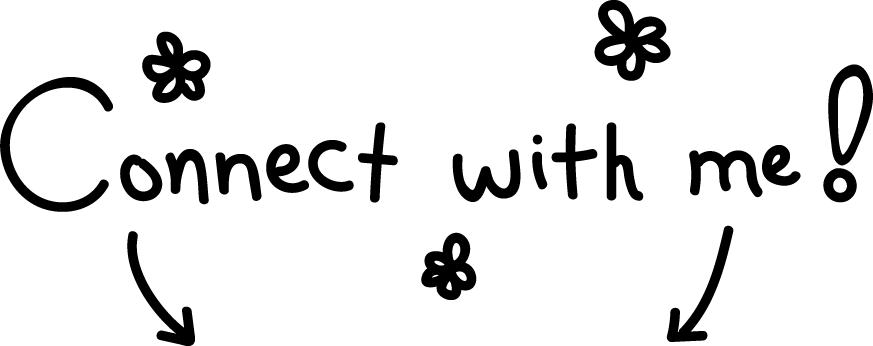Climate change existed since 1760, however it wasn't till 2019 that the world began taking active steps to stop it. Despite our efforts, the effects of climate change are expected to peak in 2044, resulting in extinction of countries, animals and vegetation.
Our goal is to design a new ecology-based economy with innovative concepts for products, services, and experiences for a speculative 2080 society. In this economy, a new eco-currency, KARMA, was introduced in 2019 where every citizen around the world was immediately able to generate and spend KARMA by benefiting, mitigating the use of, or consuming natural resources.
As a global society by 2080, we end up managing natural resources better thanks this new form of currency. Our new-to-the-world concepts will act as proof of people and the planet living in balance.
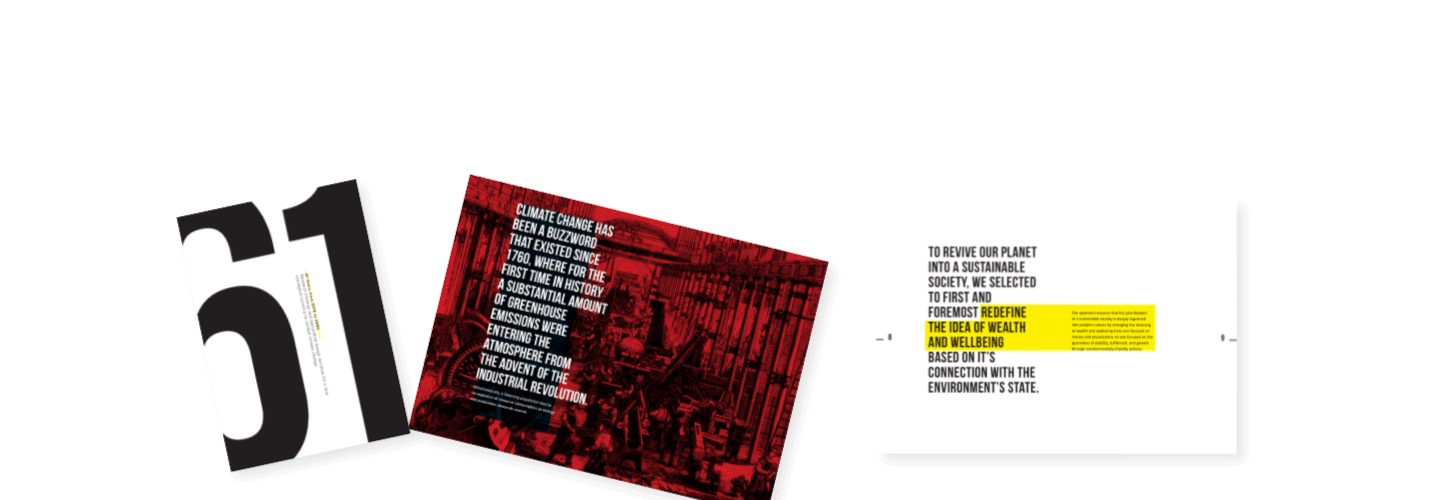

DURATION
May 2019 - Jun. 2019
MY ROLE
Experience Design Storytelling Visual Design
TEAM

Priscilla Li


Shrey Malik

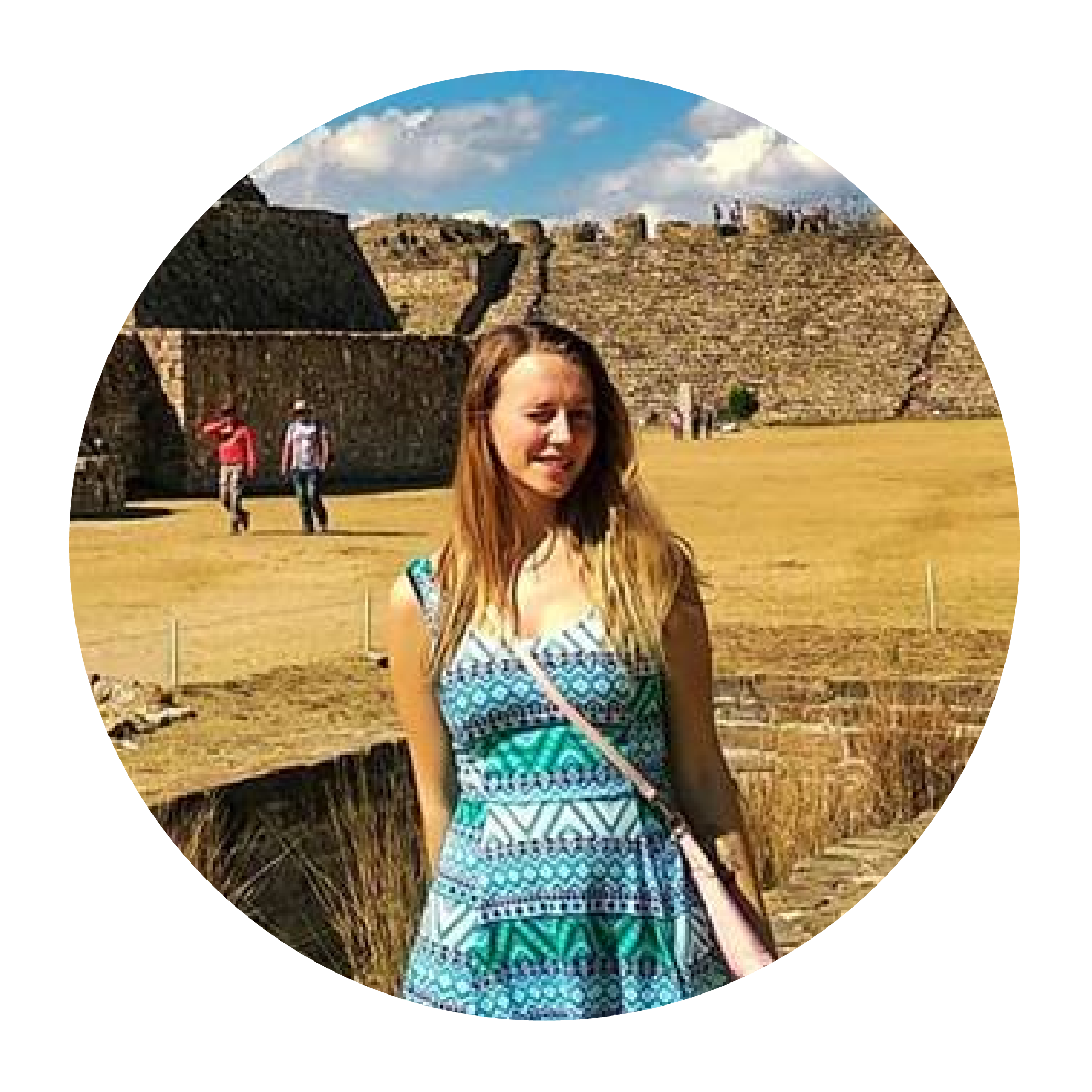
Alina Romashkova


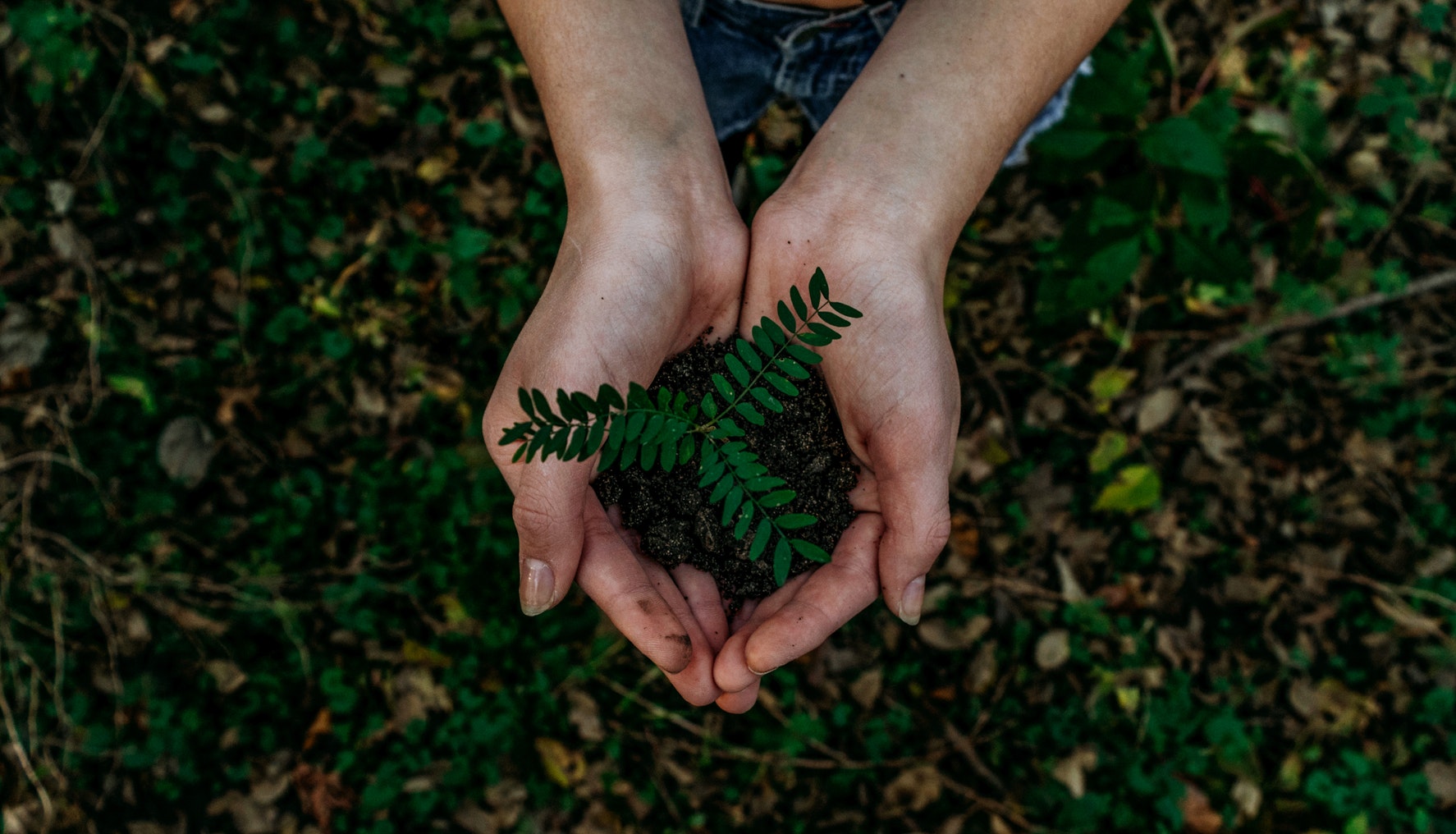
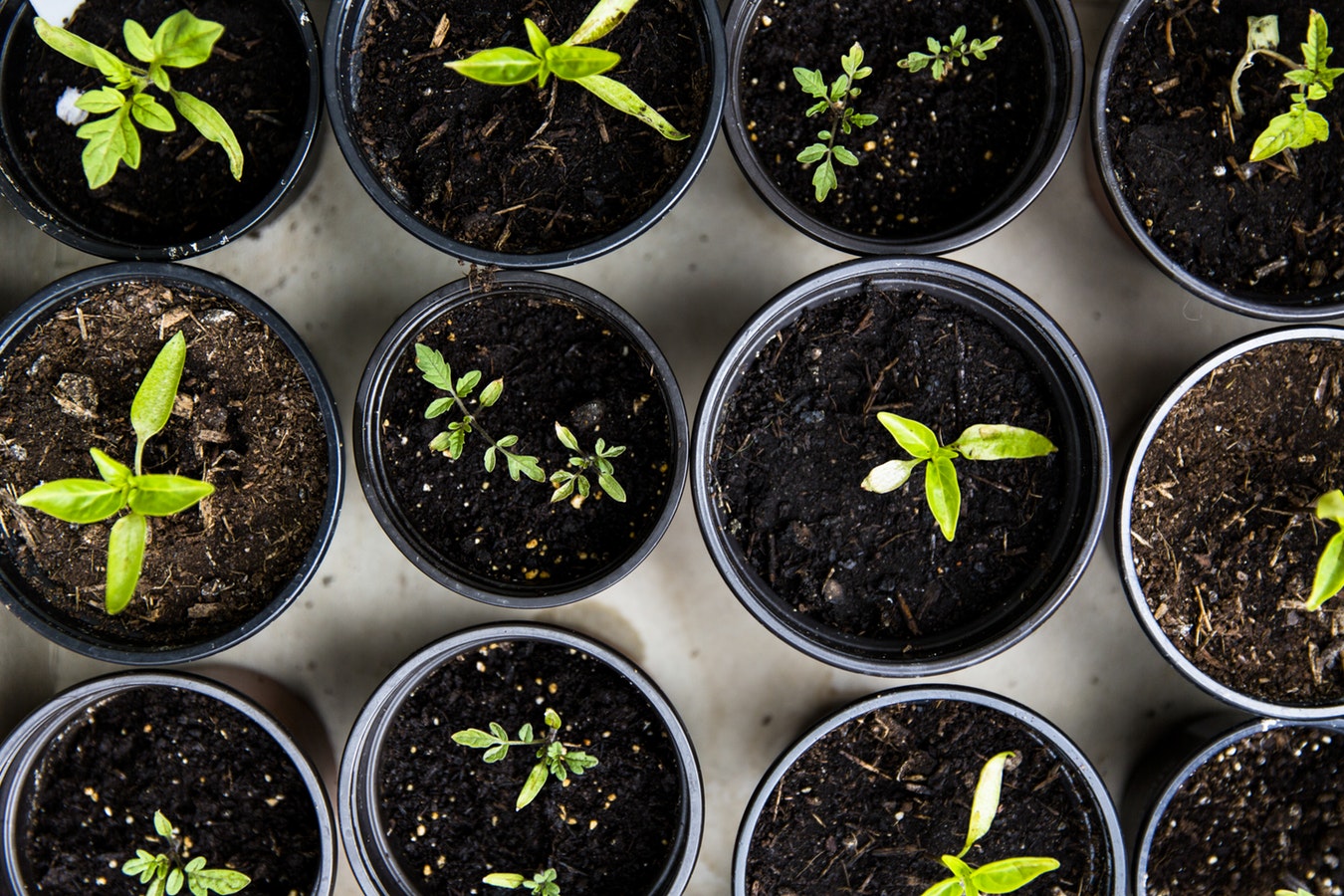
To revive our planet into a sustainable society, we selected to redefine the idea of wealth and well-being based on it's connection with the environment's state.
Our approach ensures that the prioritization of a sustainable society is deeply ingrained into people’s values by changing the meaning of wealth and well-being from one focused on money and possessions, to one focused on the guarantee of stability, fulfillment, and growth through environmentally-friendly actions.
Our approach ensures that the prioritization of a sustainable society is deeply ingrained into people’s values by changing the meaning of wealth and well-being from one focused on money and possessions, to one focused on the guarantee of stability, fulfillment, and growth through environmentally-friendly actions.



We approached the creation of a sustainable society by focusing on the following areas: environmental problems, the global economy, and human motivations.
We identified core environmental sectors humans are negatively impacting. Within these sectors, we itemized various micro-actions to reverse the effects of climate change. These micro-actions ultimately dictate the formal construct of how our eco-currency KARMA will be earned and distributed among the mass.
We looked into the possibility of having one global currency and discovered that countries with different economic behaviors and needs are very difficult to unite under one currency. With the varying economic behaviour, the creation of many local currencies instead of one global currency is recommended.
We also explored various schools of thought on what a good life is throughout history. This revealed to us a recurring answer that a good life was a moderate life focused on personal growth.
We identified core environmental sectors humans are negatively impacting. Within these sectors, we itemized various micro-actions to reverse the effects of climate change. These micro-actions ultimately dictate the formal construct of how our eco-currency KARMA will be earned and distributed among the mass.
We looked into the possibility of having one global currency and discovered that countries with different economic behaviors and needs are very difficult to unite under one currency. With the varying economic behaviour, the creation of many local currencies instead of one global currency is recommended.
We also explored various schools of thought on what a good life is throughout history. This revealed to us a recurring answer that a good life was a moderate life focused on personal growth.

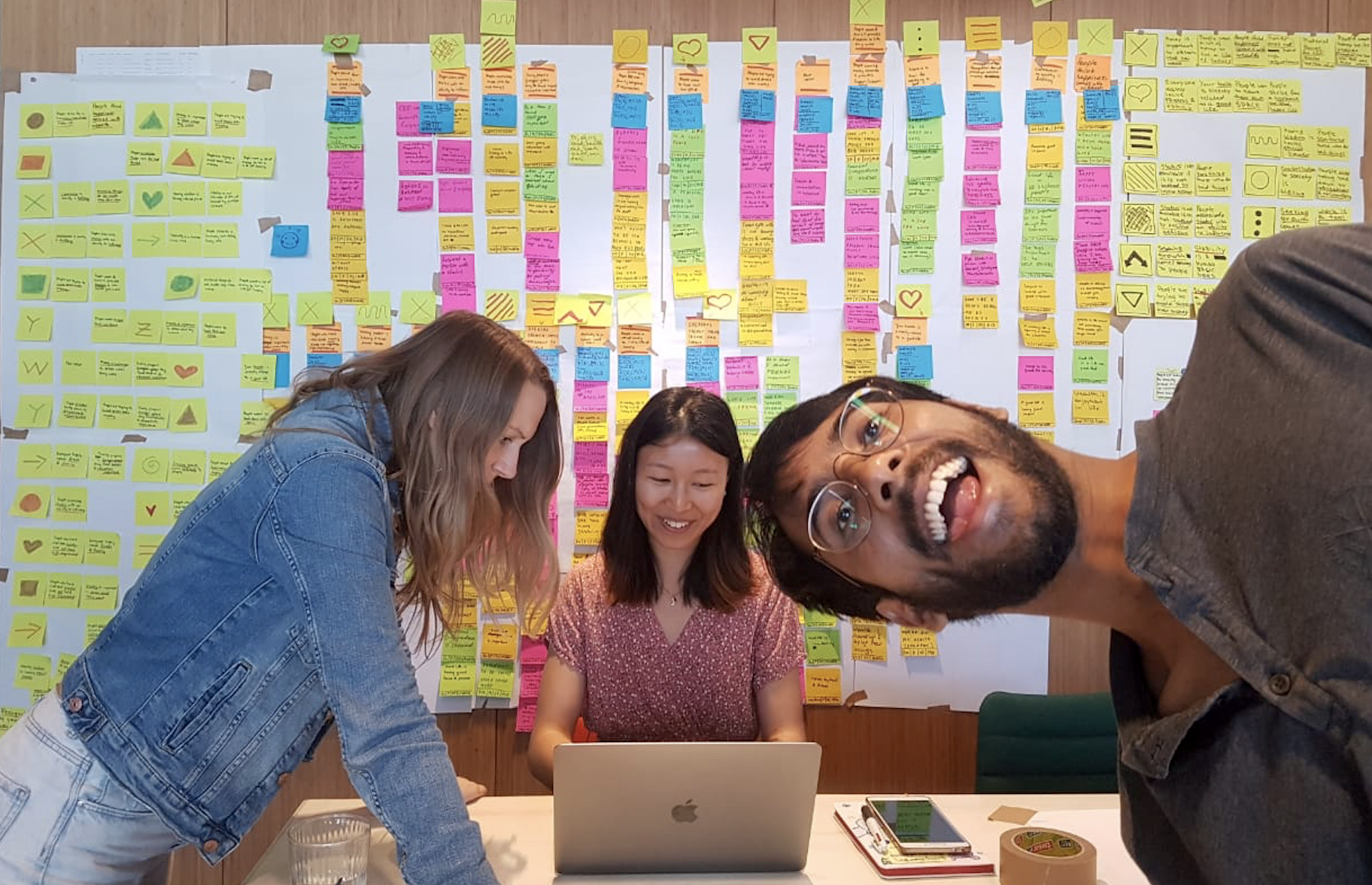
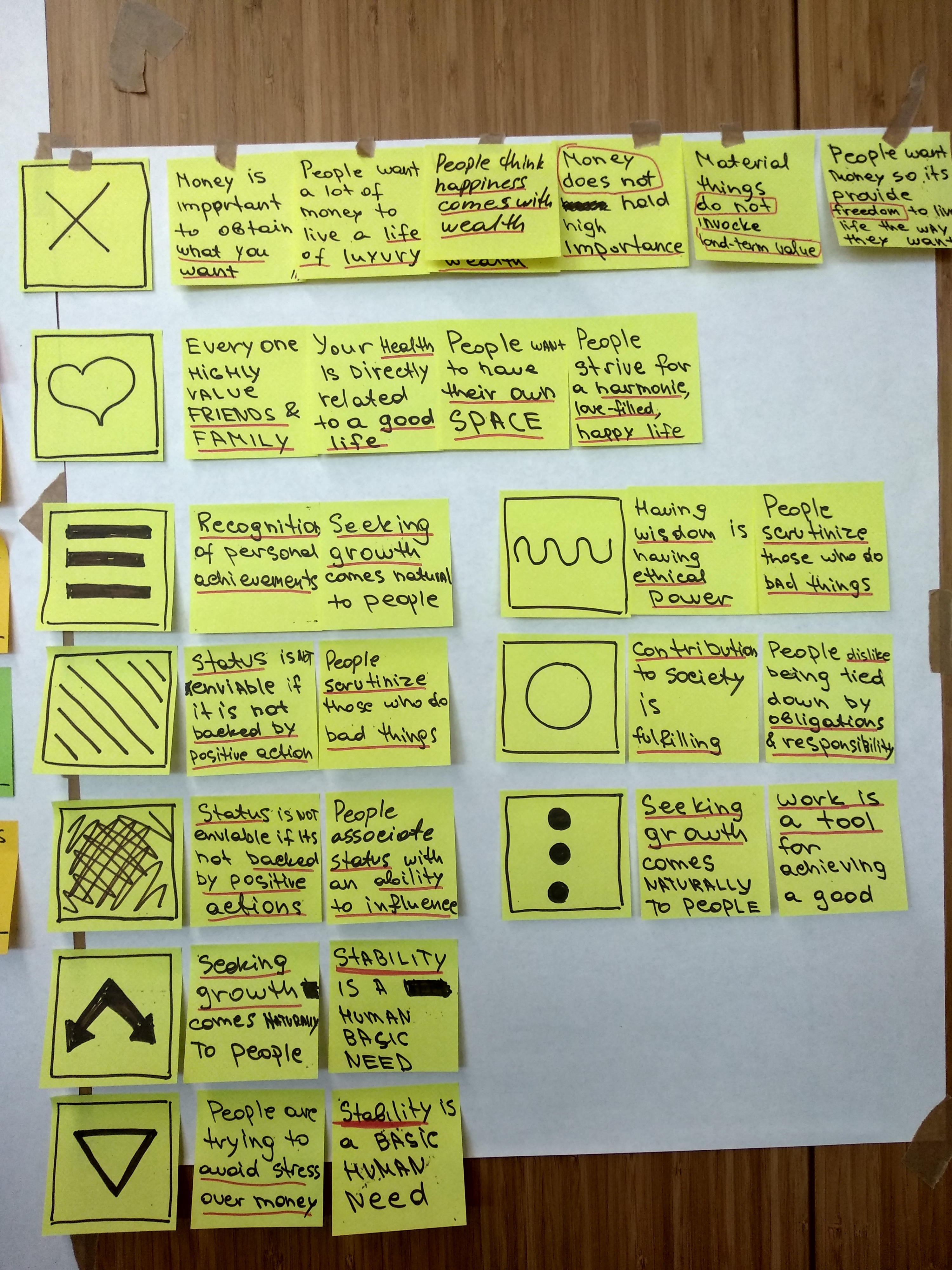
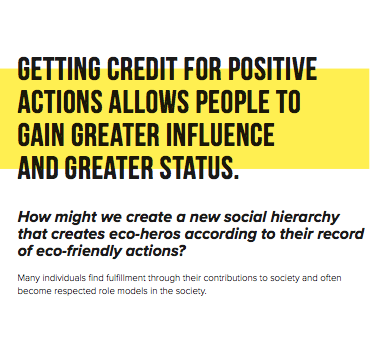
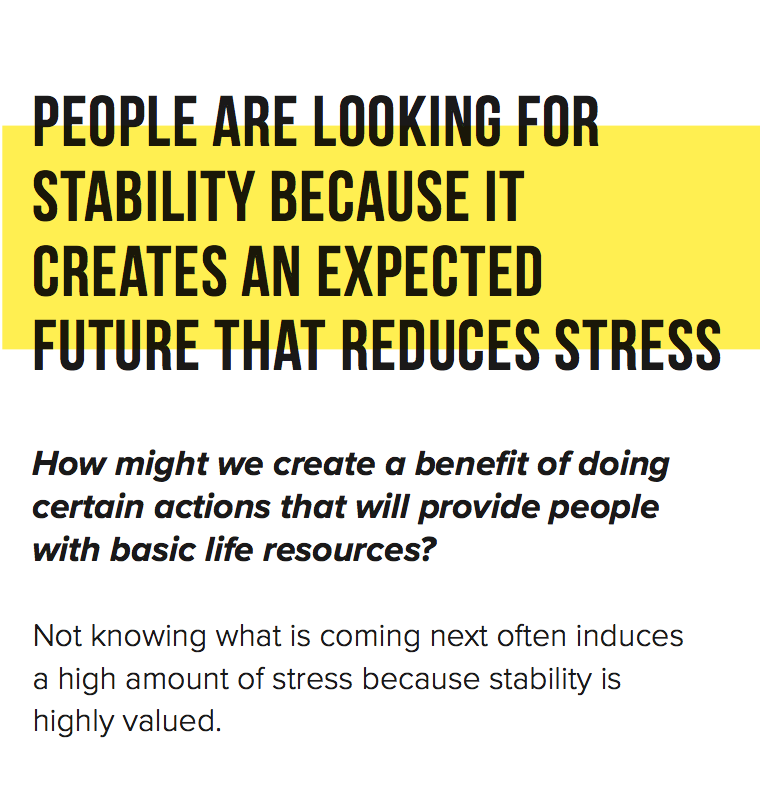
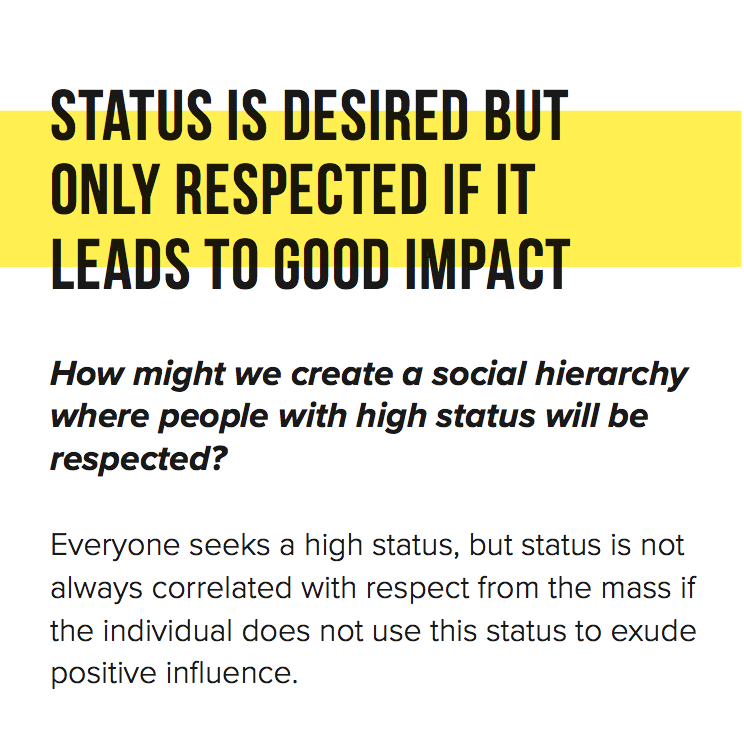
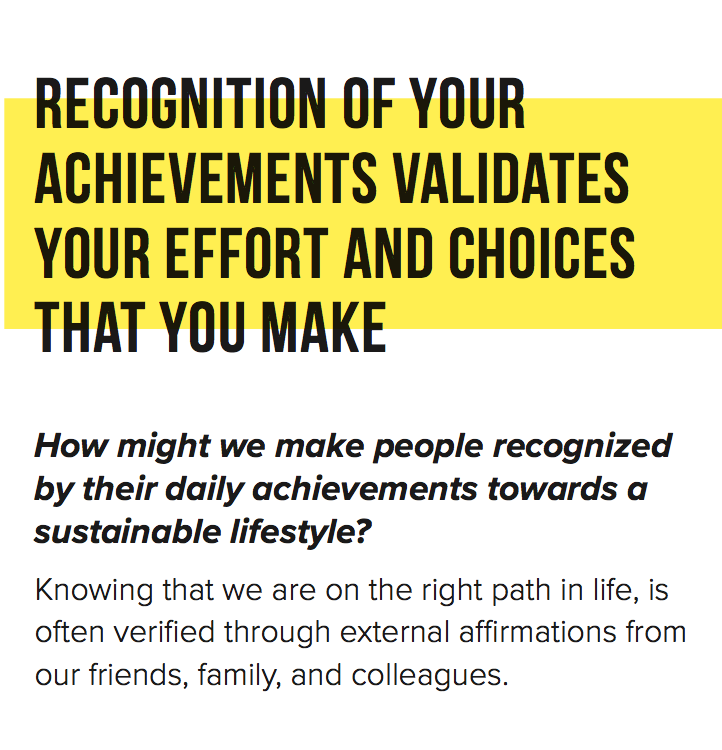
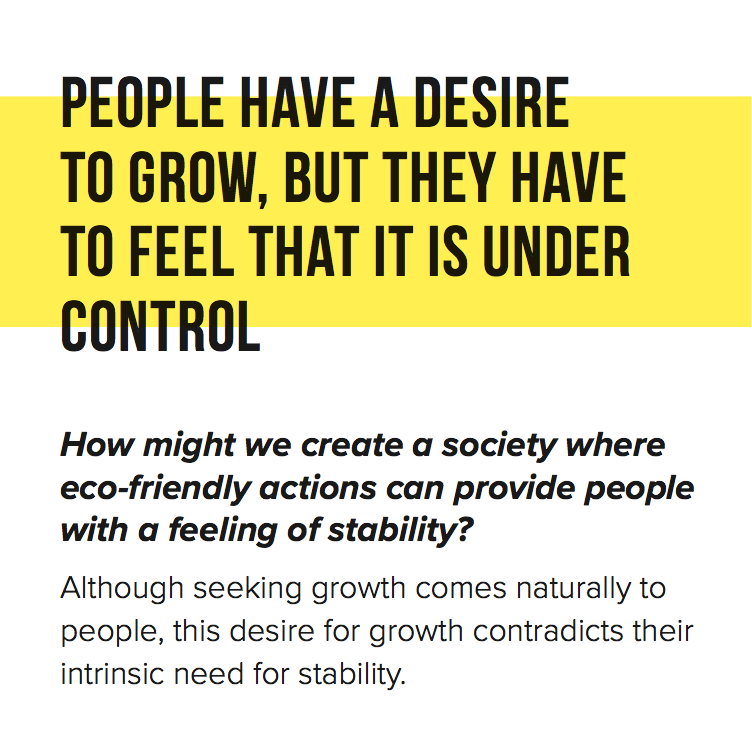
Our user research and interviews, revealed primary human motivators: the desire for stability, personal growth, and societal influence.
From our desk research, we generated a series of questions that we used in 12 user interviews. Our interviewees were from various socioeconomic classes (homeless to upper middle class), age groups (early 20s to late 70s), and from 5 different nationalities around the world (US, UK, India, Cuba, and Russia.)
From our user insights, we identified the primary human motivators and generated how might we’s to identify design opportunities for our speculative sustainable society in 2080.
From our desk research, we generated a series of questions that we used in 12 user interviews. Our interviewees were from various socioeconomic classes (homeless to upper middle class), age groups (early 20s to late 70s), and from 5 different nationalities around the world (US, UK, India, Cuba, and Russia.)
From our user insights, we identified the primary human motivators and generated how might we’s to identify design opportunities for our speculative sustainable society in 2080.
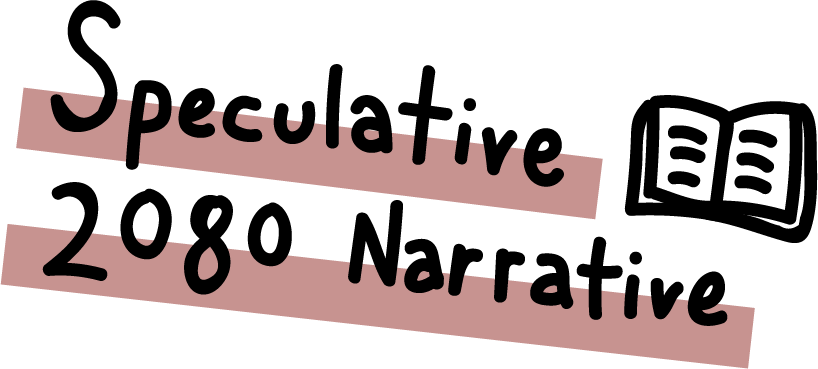

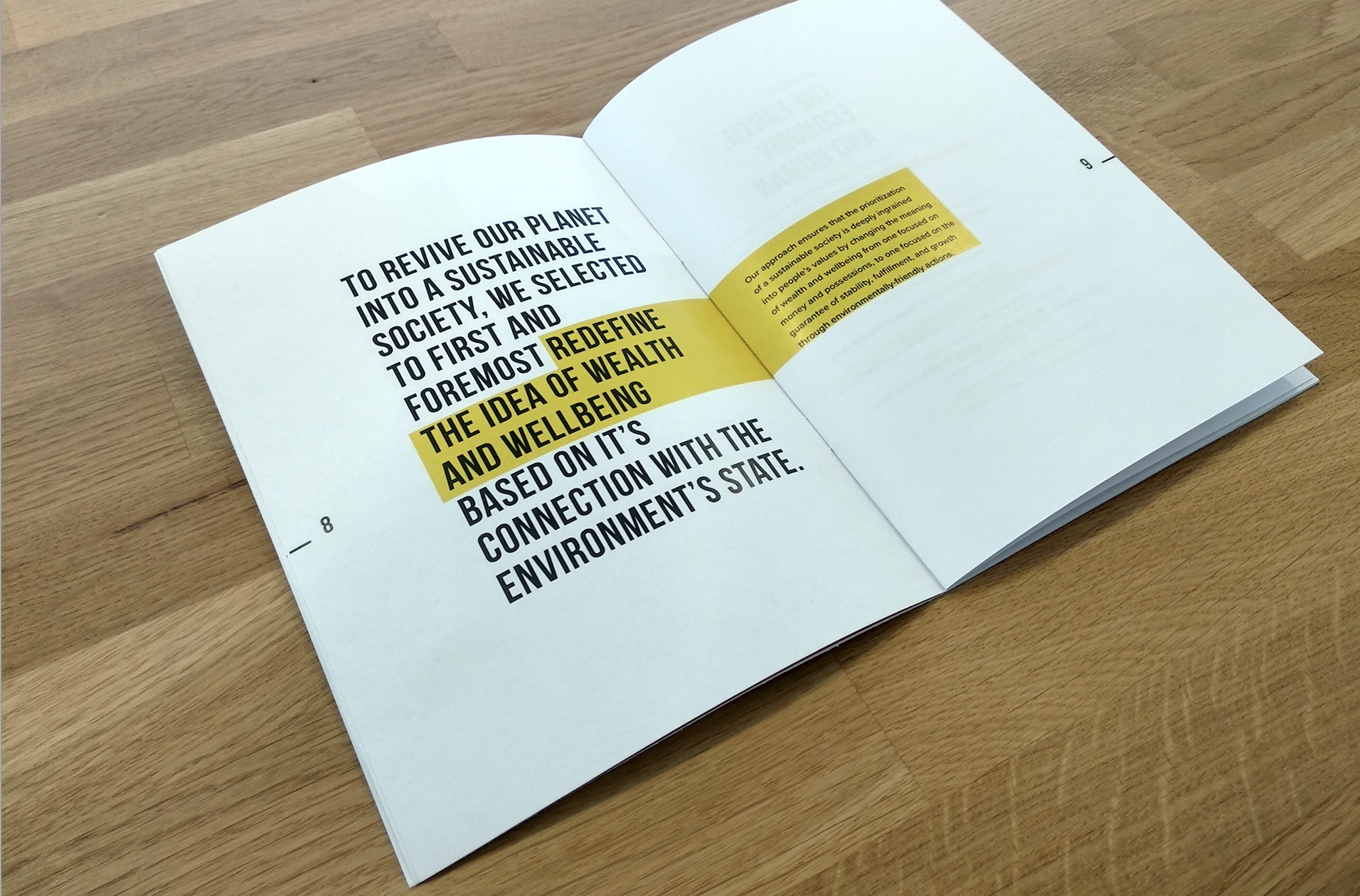
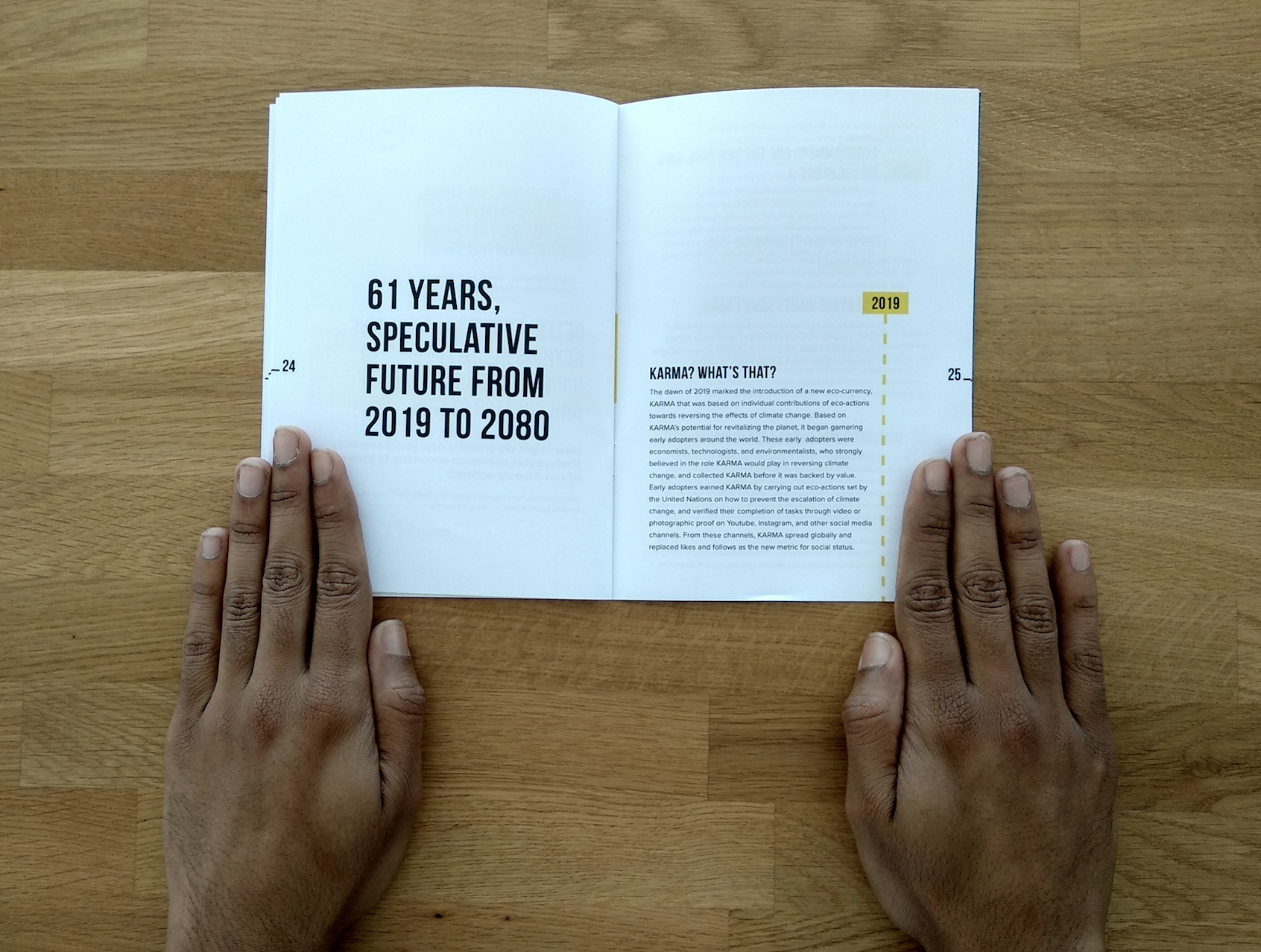
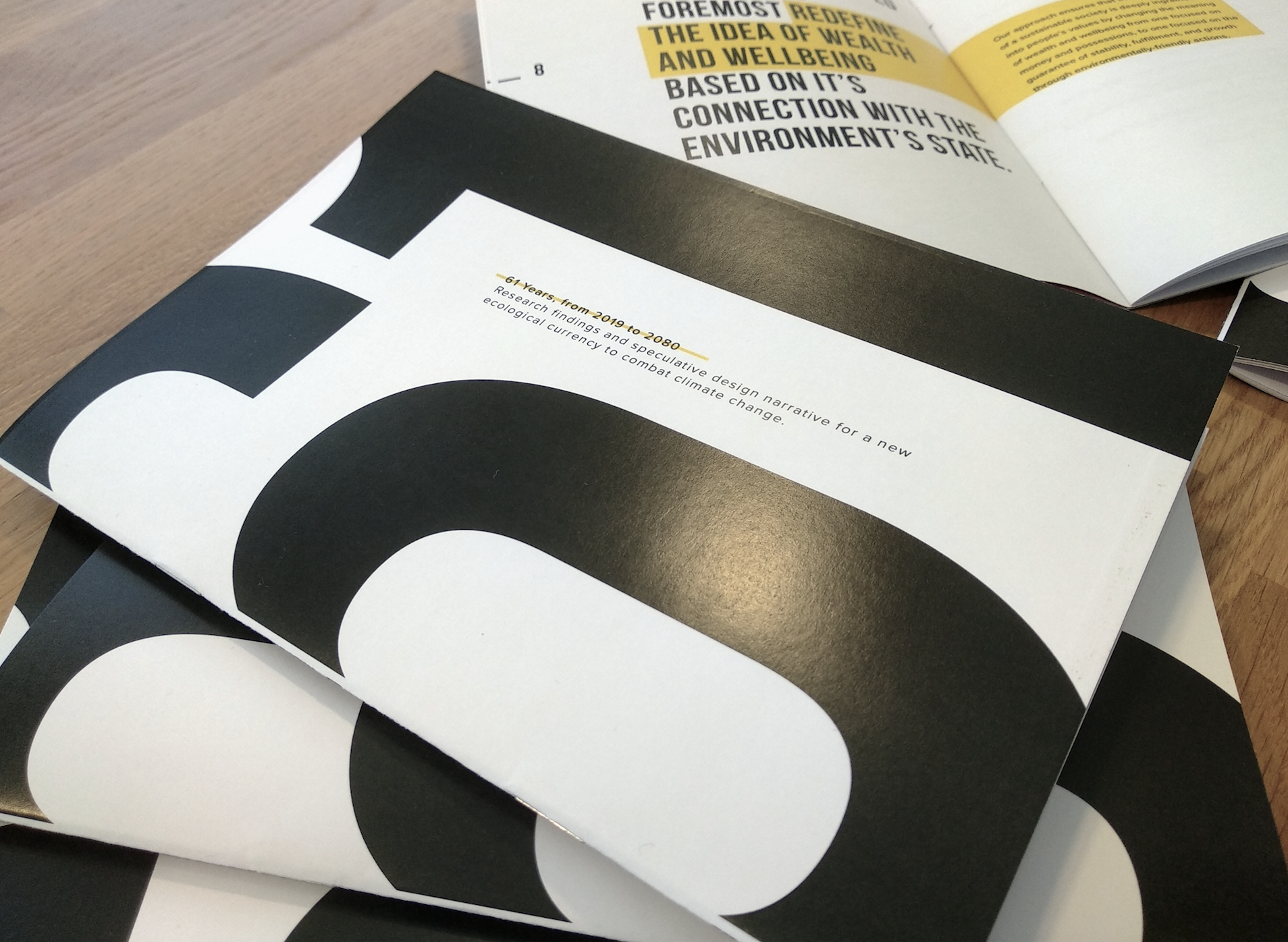
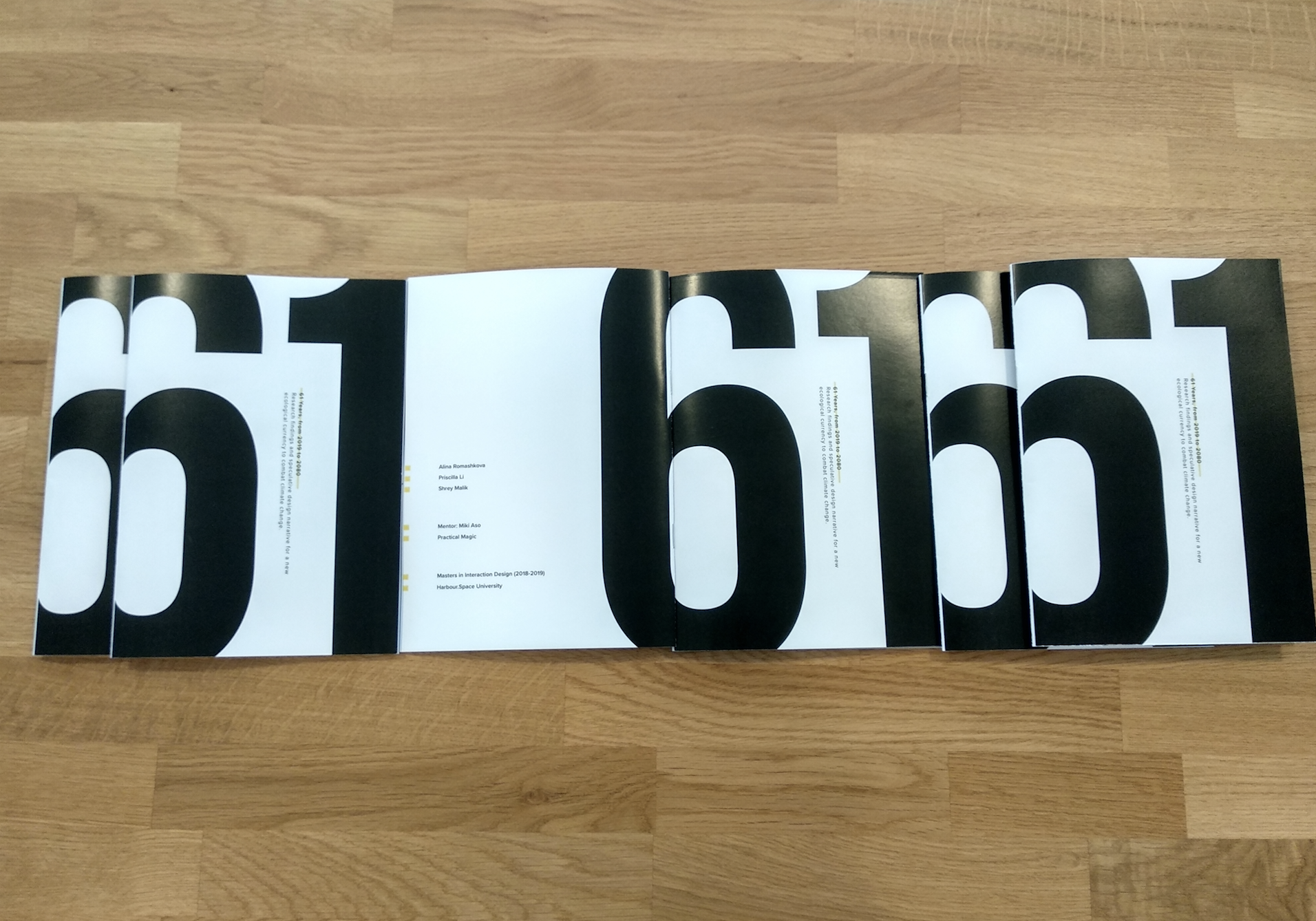
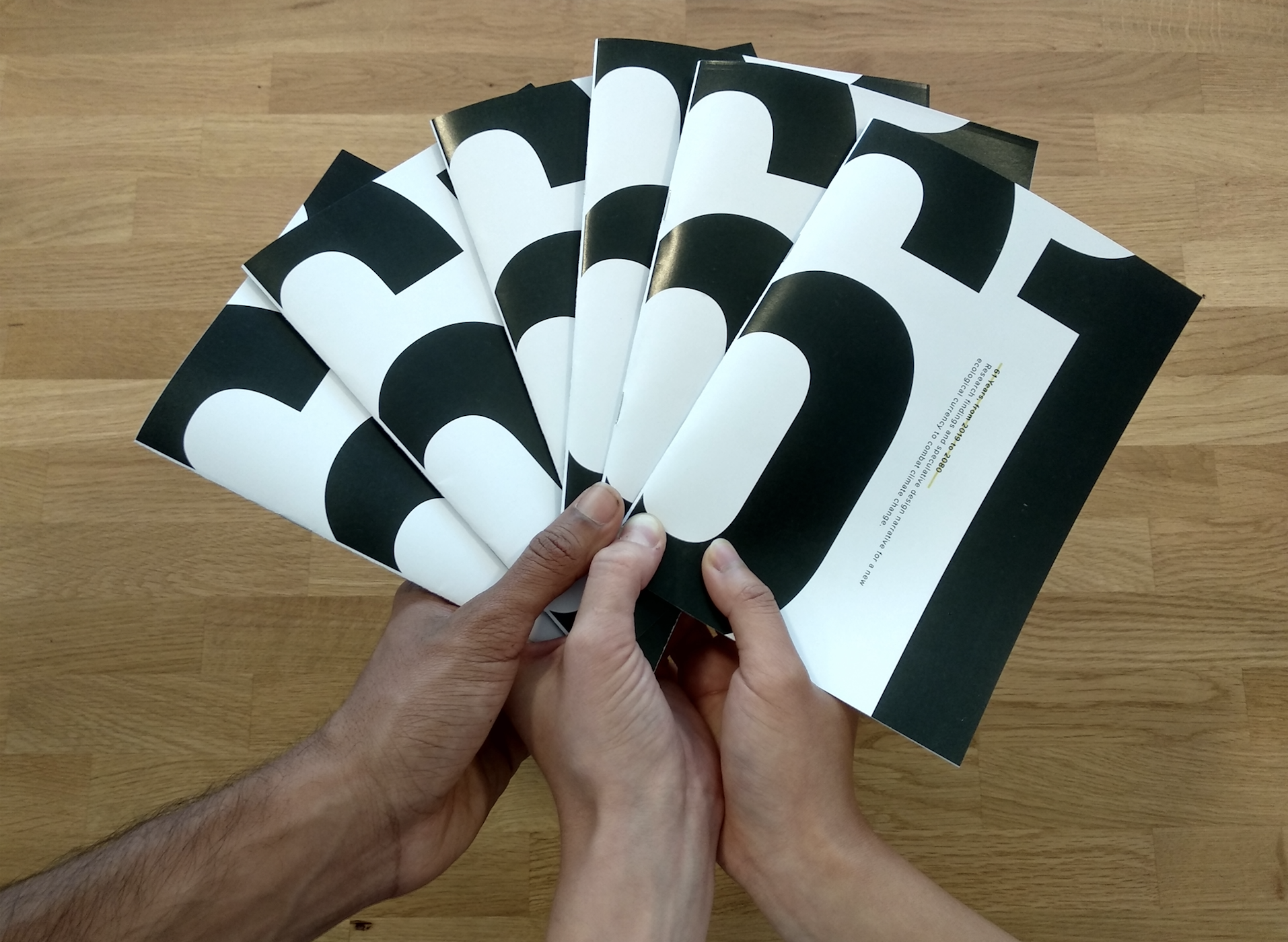
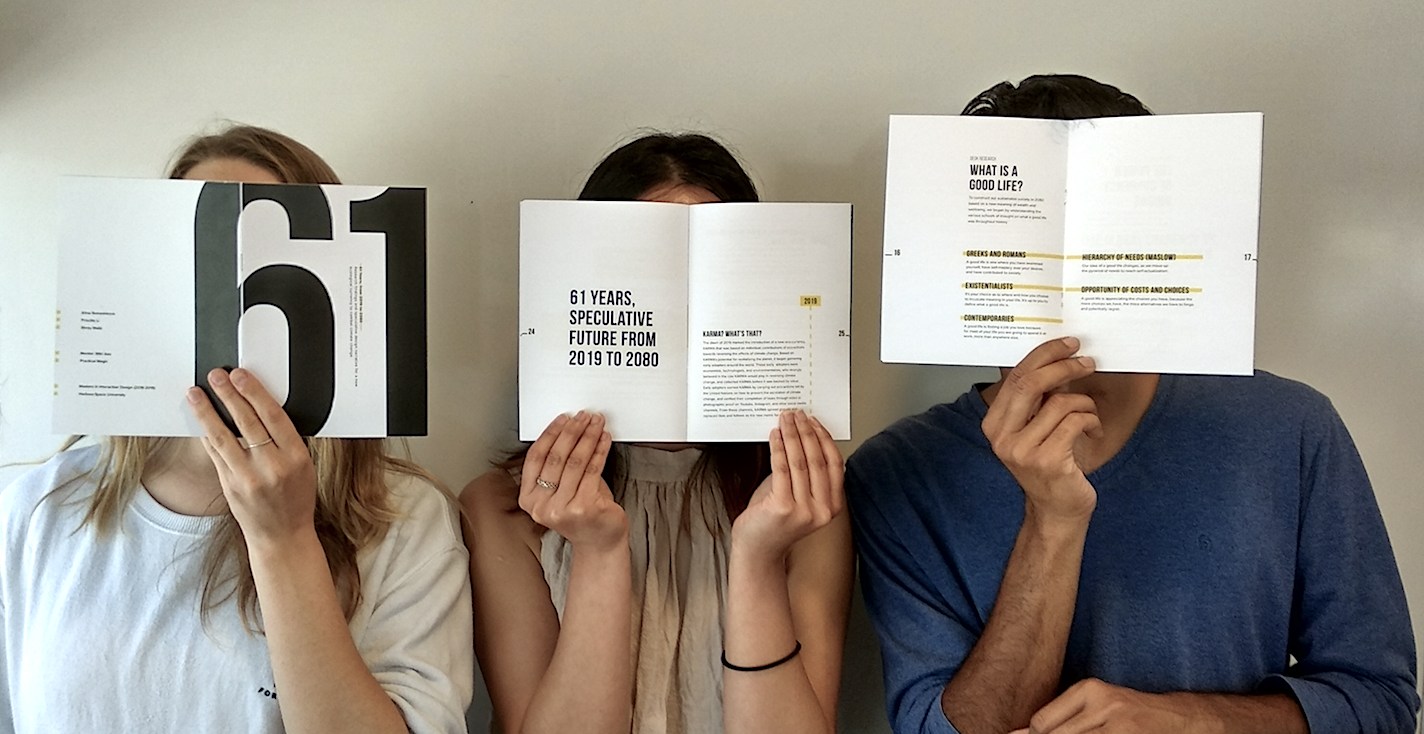
Our research and speculative narrative was documented into a printed book that serves as an artifact for 2080.
With the opportunities identified from our how might we's and redefining wealth and well-being to mean having a moderate sustainable lifestyle focused on personal growth through environmentally-friendly actions, we designed our timeline from 2019 to 2080 on how our sustainable society was achieved: Storyline
With the opportunities identified from our how might we's and redefining wealth and well-being to mean having a moderate sustainable lifestyle focused on personal growth through environmentally-friendly actions, we designed our timeline from 2019 to 2080 on how our sustainable society was achieved: Storyline


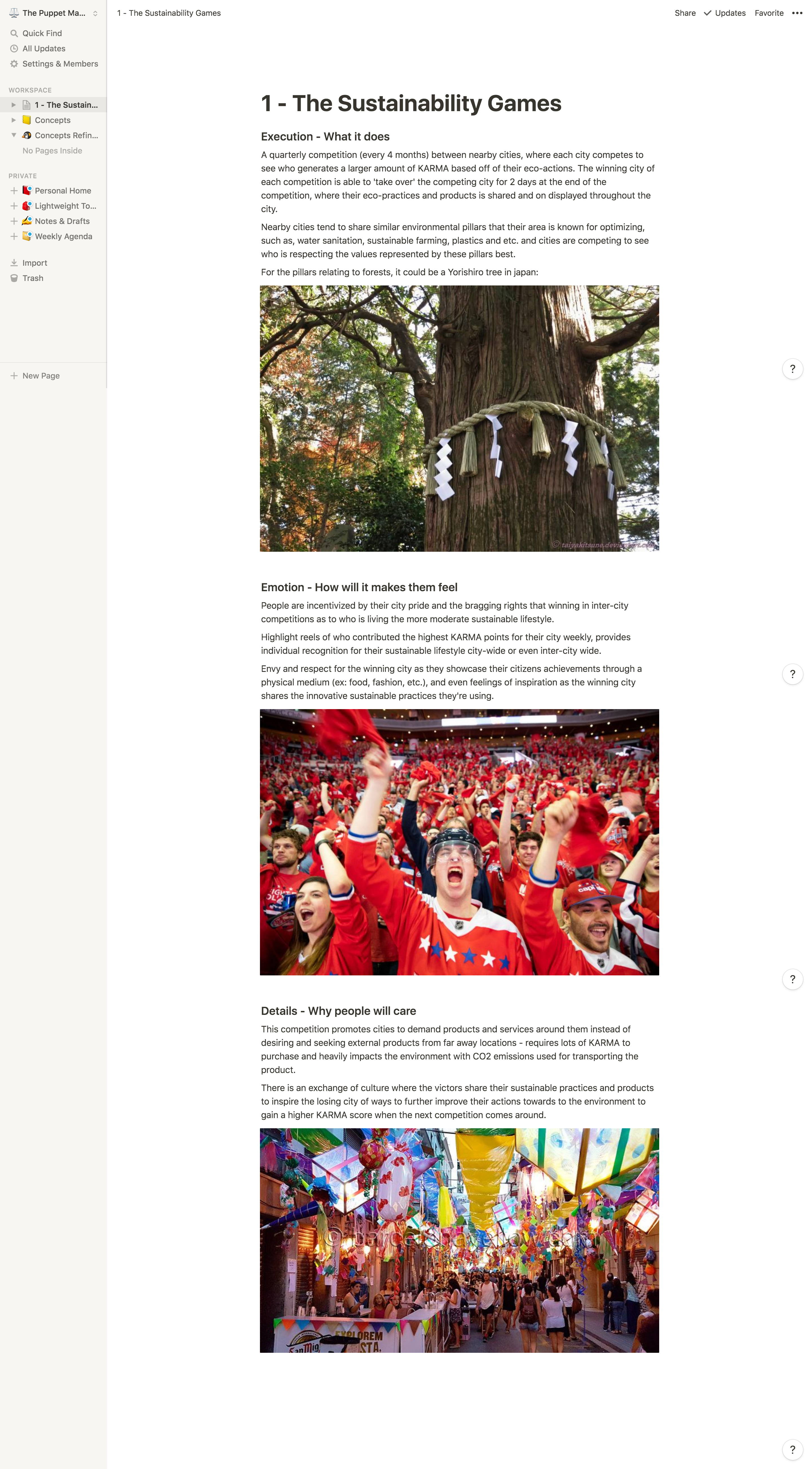
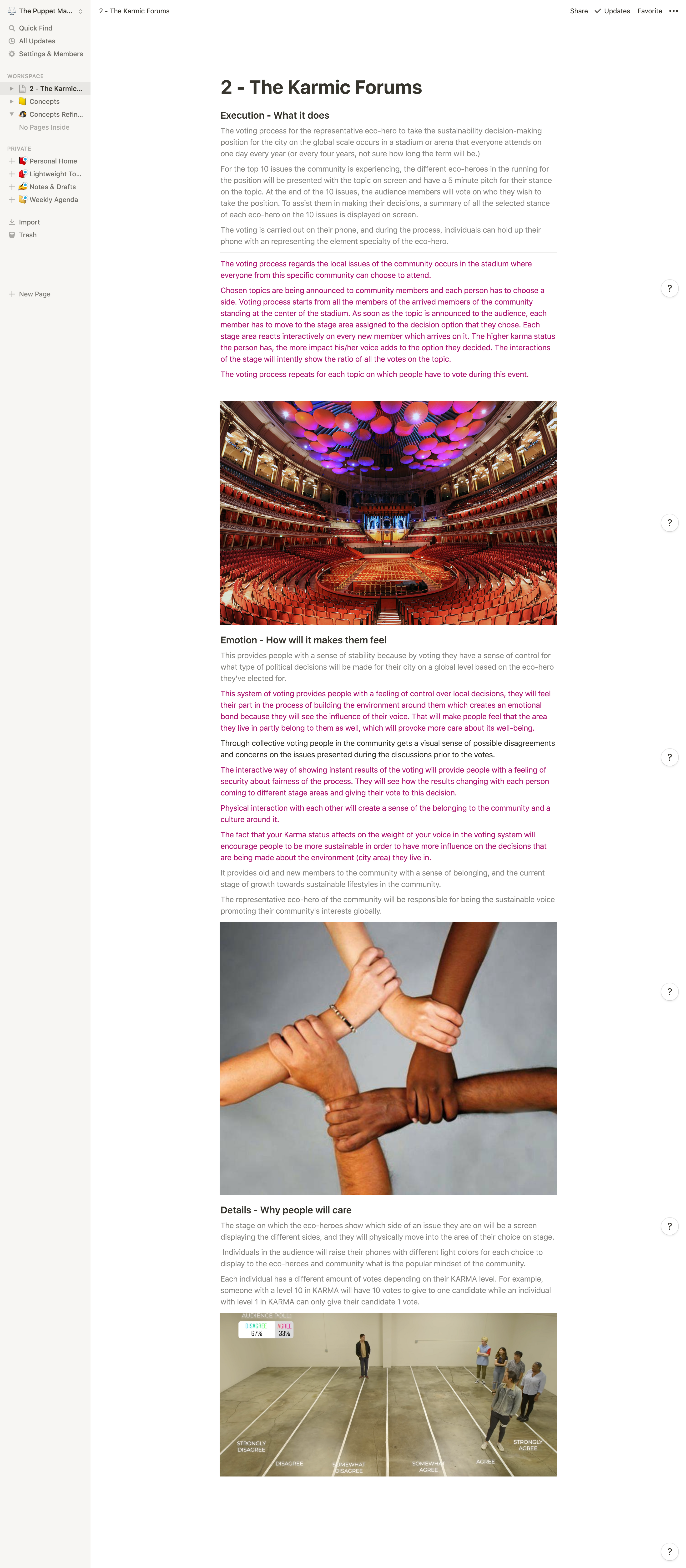

Based off our speculative 2080 society founded on the redefinition of wealth and wellbeing, we generated over 8 concepts for sustainable communal rituals in our new ecology-based economy.
Using our speculative narrative, the redefinition of wealth and wellbeing, and our how might we's, our team focused on designing new communal rituals for our speculative 2080 society.
From our user insights, we generated various concepts focused on using human motivators like desire for respected status, influence and stability to incentivize users to have a healthy and mindful relationship with their environment.
Using our speculative narrative, the redefinition of wealth and wellbeing, and our how might we's, our team focused on designing new communal rituals for our speculative 2080 society.
From our user insights, we generated various concepts focused on using human motivators like desire for respected status, influence and stability to incentivize users to have a healthy and mindful relationship with their environment.

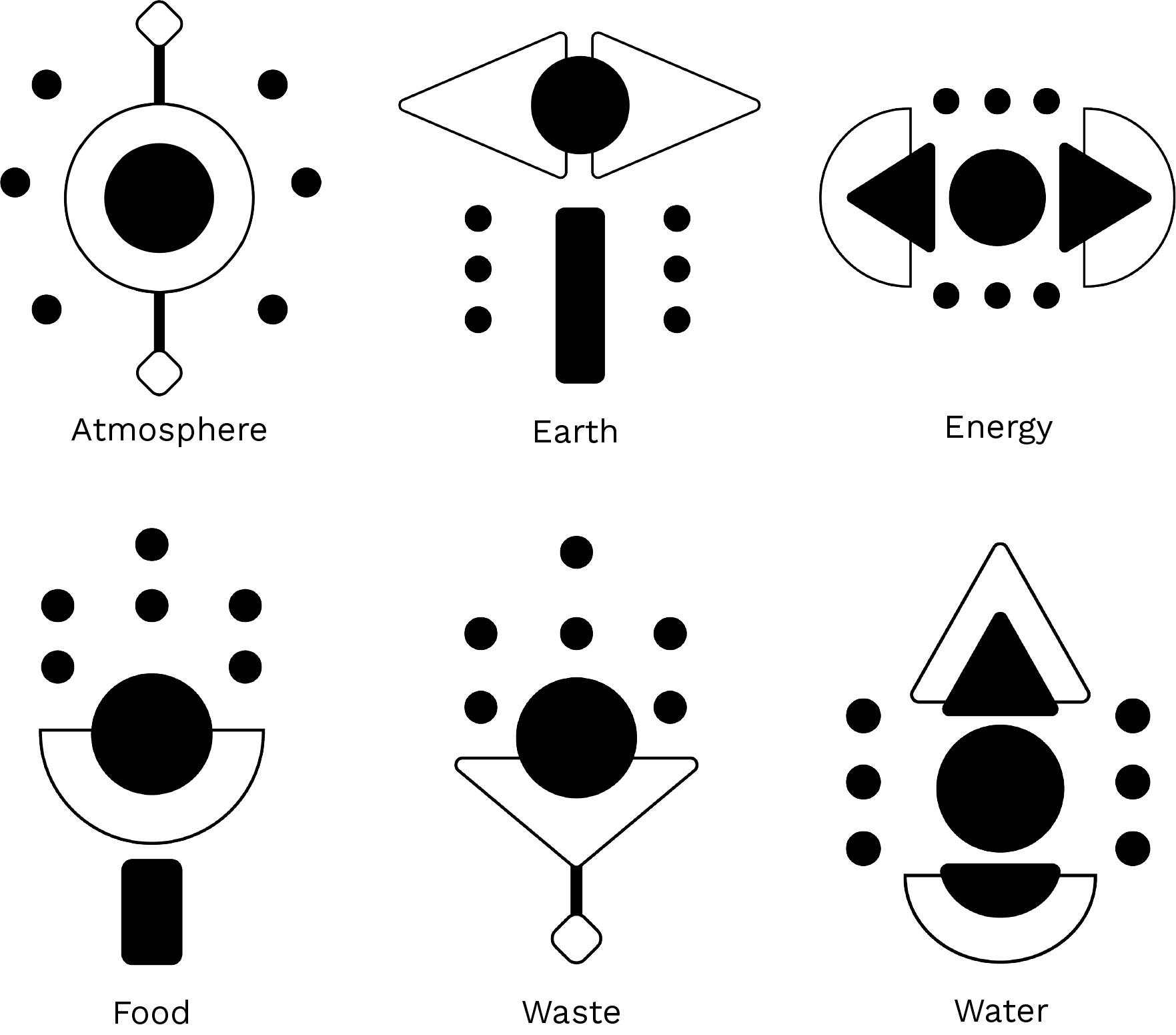
From our ideas, we selected 'The Death of an Eco-hero' and designed symbols of status, a communication application between the planet and its inhabitants, and a death ritual to honor lives dedicated to sustainability.
We designed symbols of status to recognize individuals (eco-heroes) who dedicated their lives to sectors of environmental impact. These sectors are based off of our initial desk research on current environmental areas we were fueling climate change through.
The resulting environmental symbols for eco-heroes were elemental tattoos: atmosphere, earth, energy, food, waste and water. In addition, we compiled various decomposition methods for the human body for each of these elements.
We designed symbols of status to recognize individuals (eco-heroes) who dedicated their lives to sectors of environmental impact. These sectors are based off of our initial desk research on current environmental areas we were fueling climate change through.
The resulting environmental symbols for eco-heroes were elemental tattoos: atmosphere, earth, energy, food, waste and water. In addition, we compiled various decomposition methods for the human body for each of these elements.
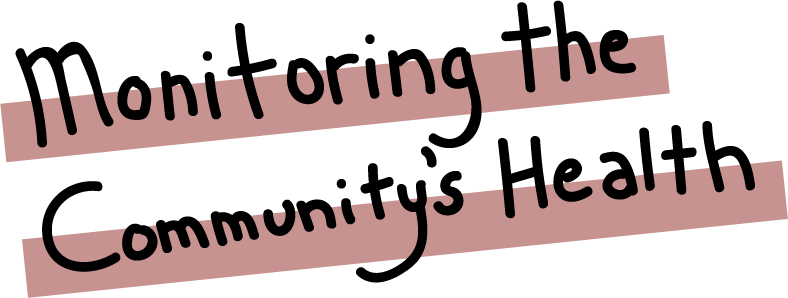
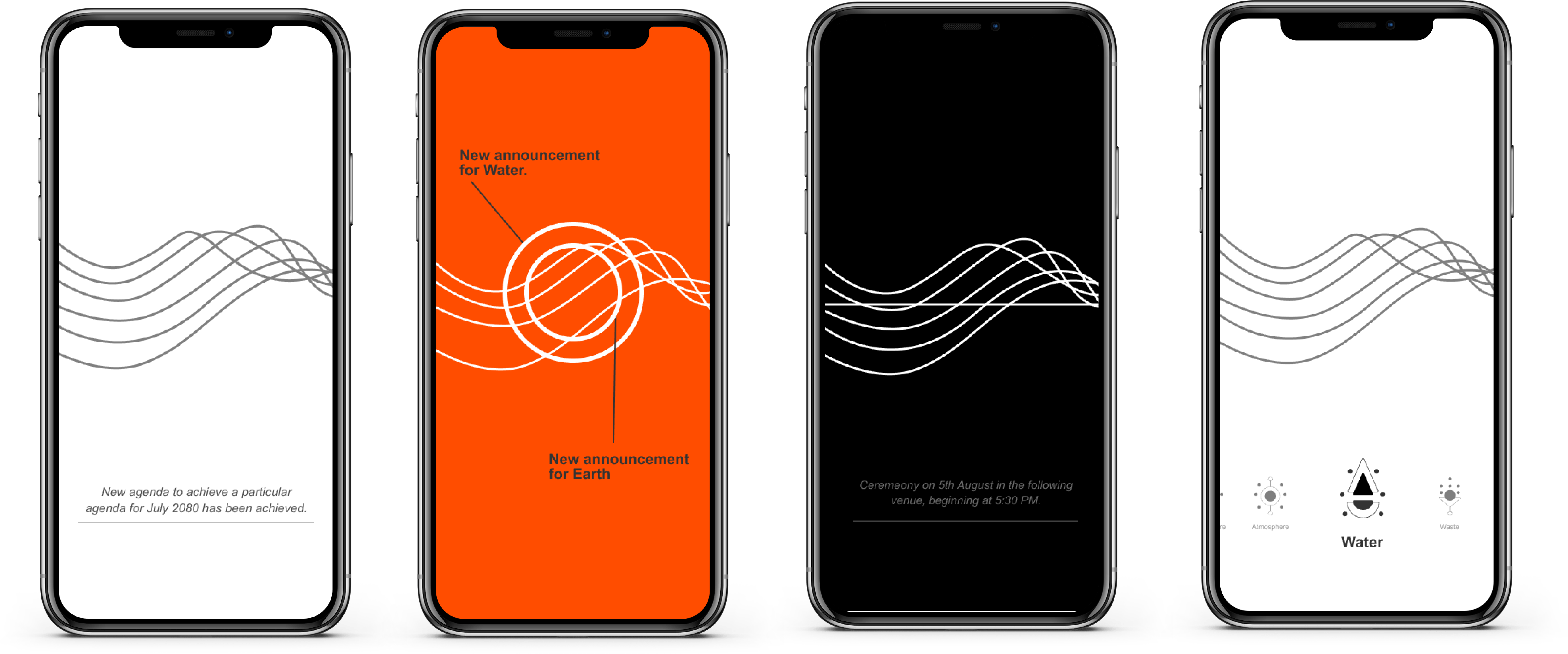
Community Announcements
Receive updates on their community's environmental health.
Obtain alerts on new announcements from the community's eco-heroes.
Eco-hero Responsibilities
Ability to communicate with the community.
Monitor the health of environmental element they are responsible for in their community.
Serve as the medium between the community's environment and its inhabitants.
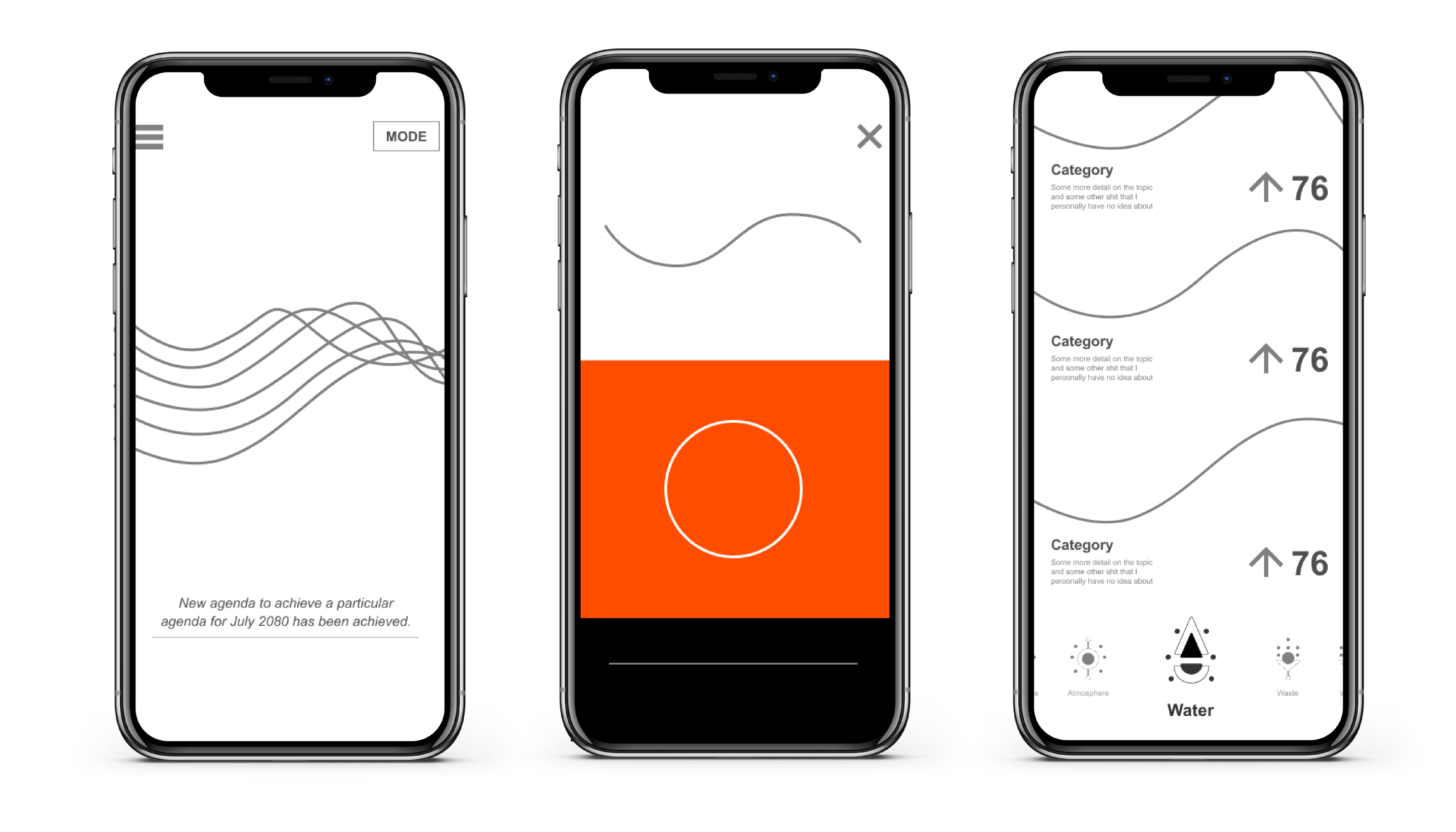
The eco-hero's primary responsibility is serving as a medium between the planet and it's inhabitants - providing continuous updates to their respective communities on the health of their environment.
The eco-hero communicates with their community members through an mobile application. On this application the eco-hero can choose to send updates to the public or use it as a tool to evaluate the health of the environment.
There are three types of announcements they can send. One is an alert on agendas the community is trying to achieve, such as reducing carbon monoxide levels by 3%. Another type are updates on changes in the environment that the community should pay attention to. Finally the third type of annoucement is automatically sent when an eco-hero passes away, and the public is alerted of the upcoming death ritual for the departed eco-hero.
The eco-hero communicates with their community members through an mobile application. On this application the eco-hero can choose to send updates to the public or use it as a tool to evaluate the health of the environment.
There are three types of announcements they can send. One is an alert on agendas the community is trying to achieve, such as reducing carbon monoxide levels by 3%. Another type are updates on changes in the environment that the community should pay attention to. Finally the third type of annoucement is automatically sent when an eco-hero passes away, and the public is alerted of the upcoming death ritual for the departed eco-hero.
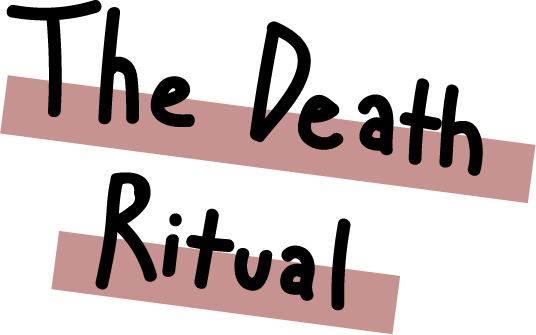
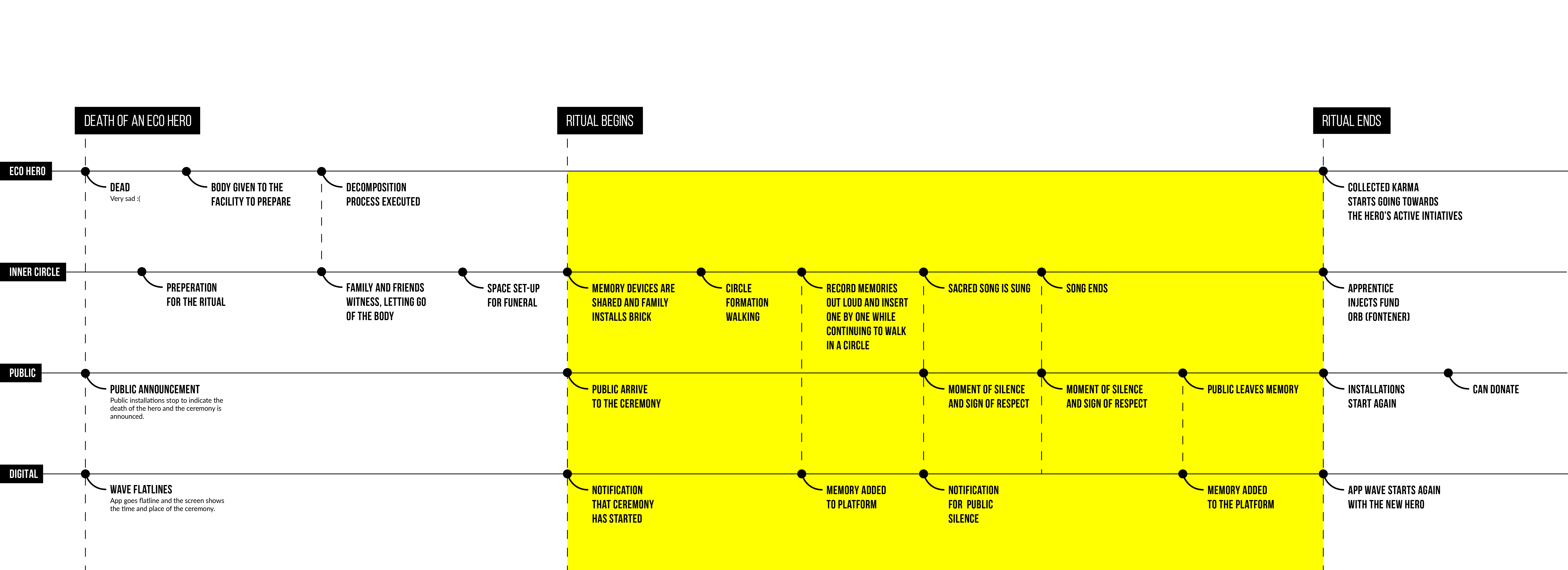
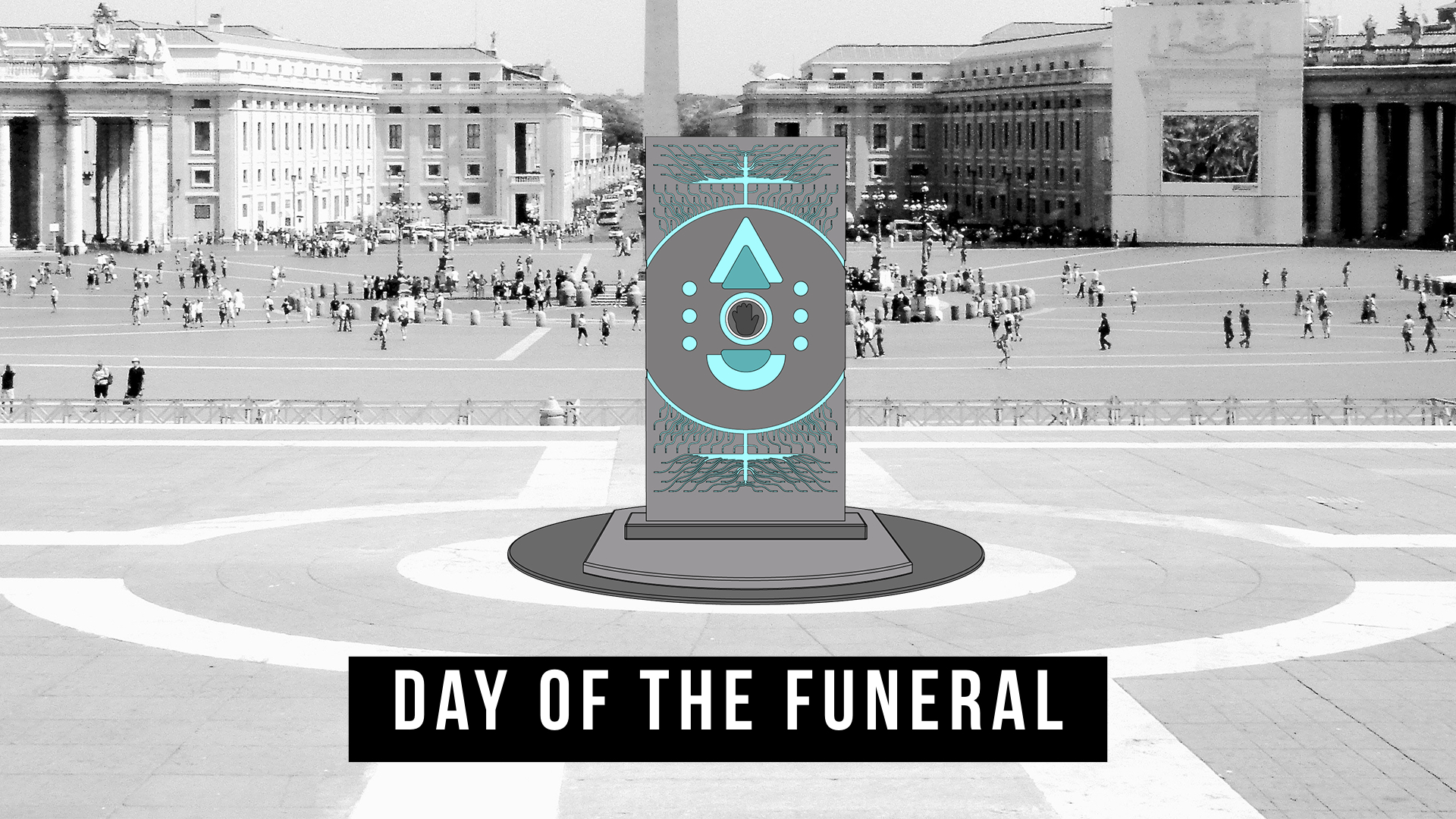
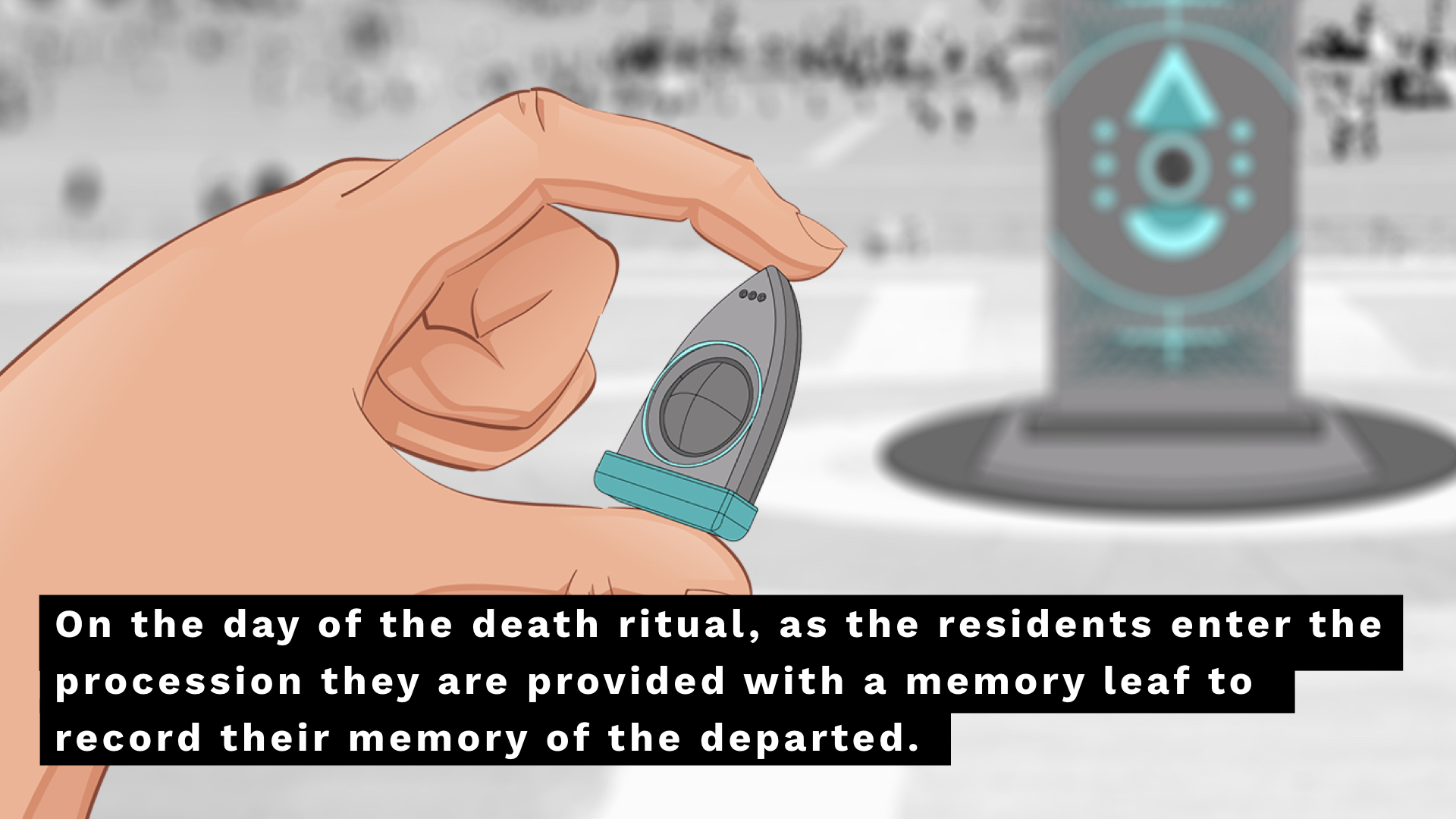
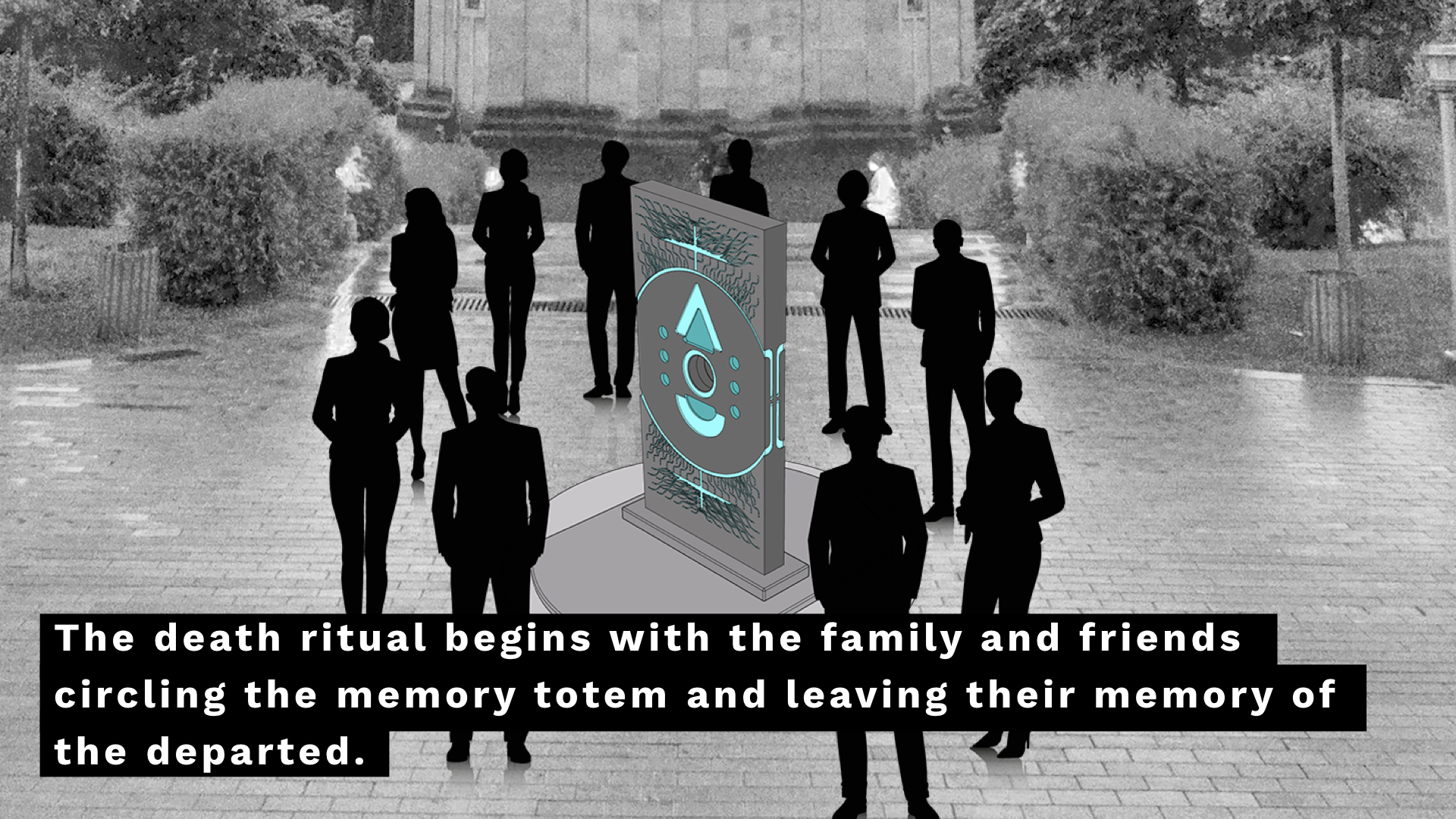
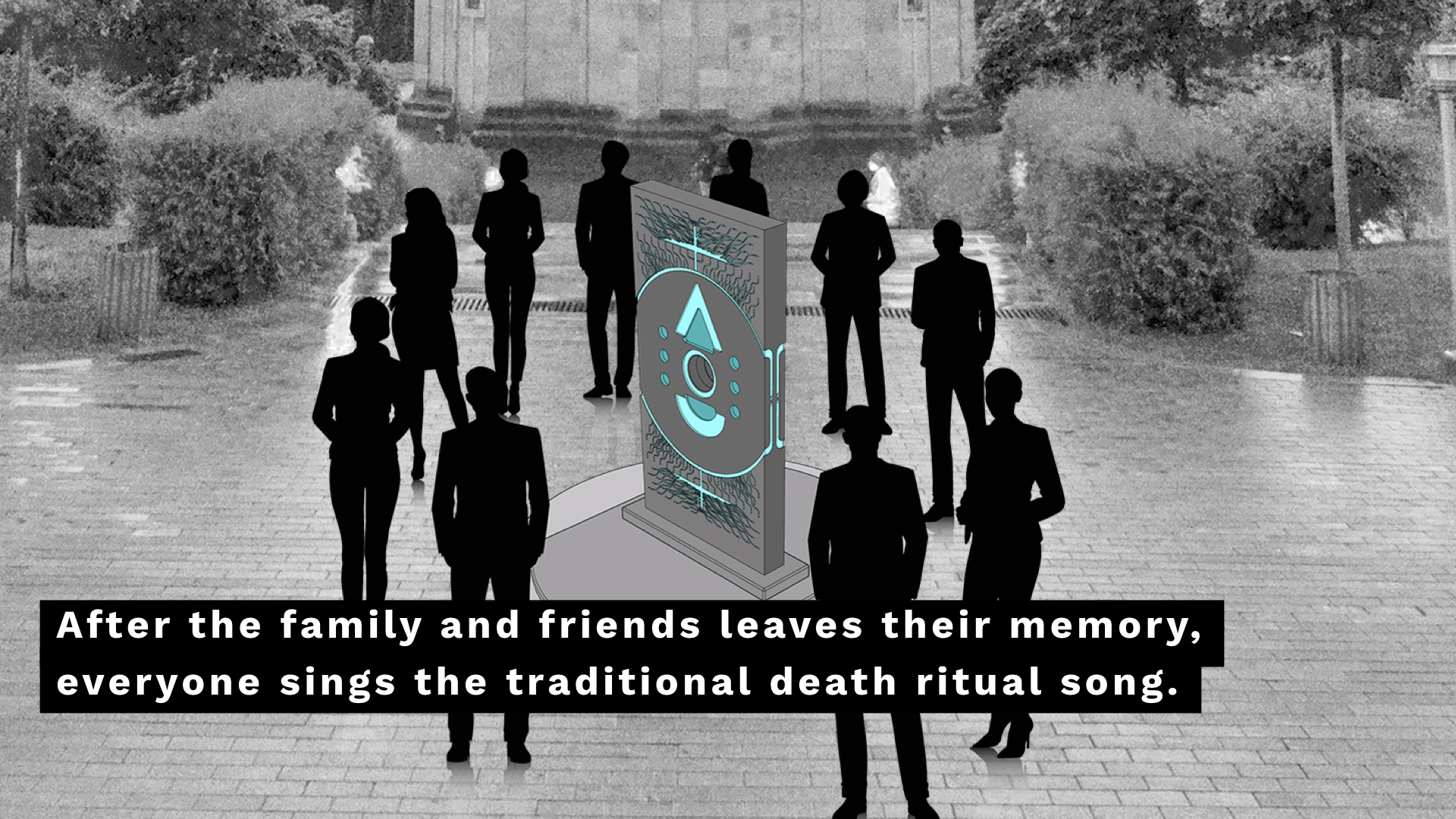
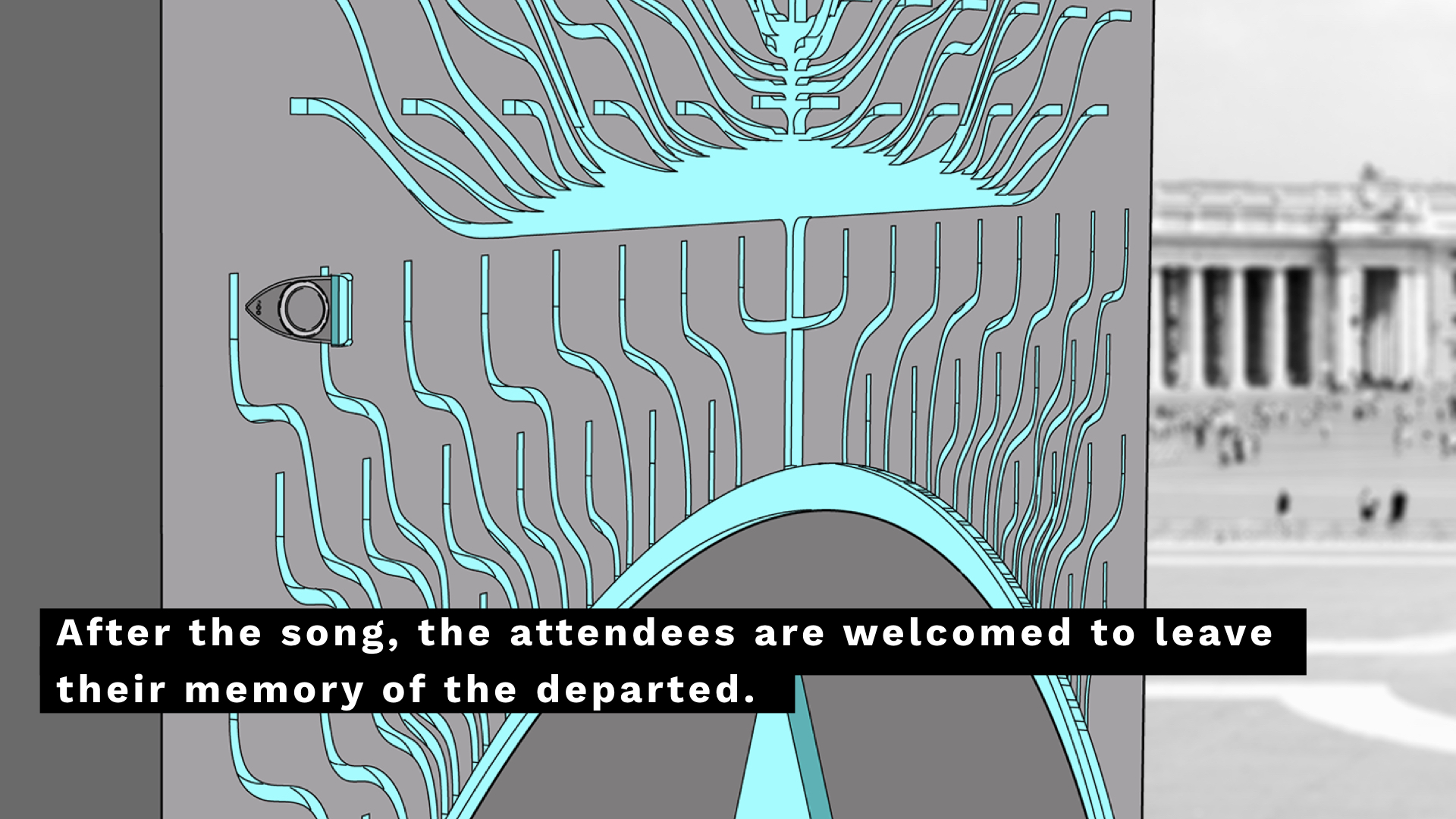
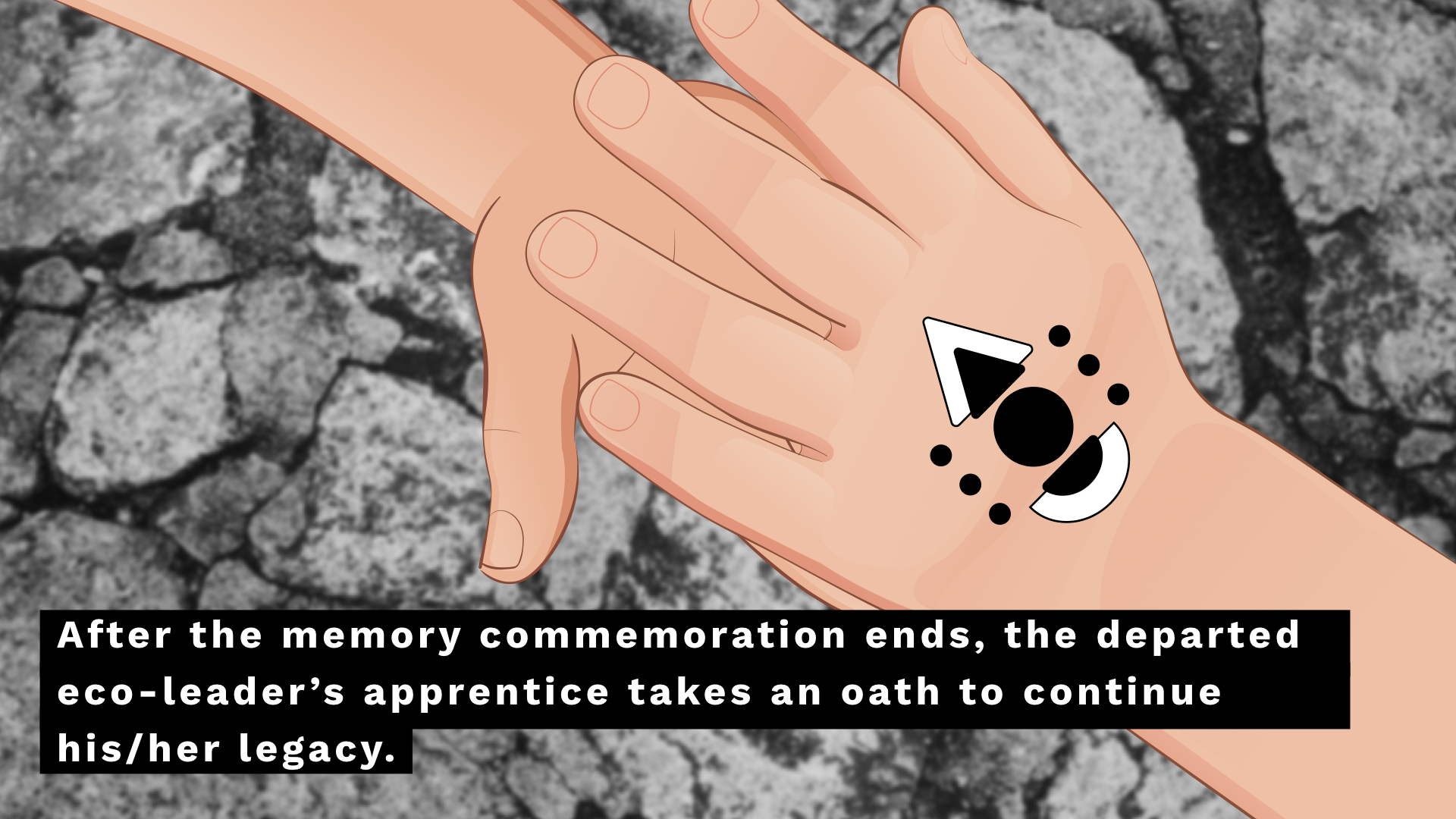
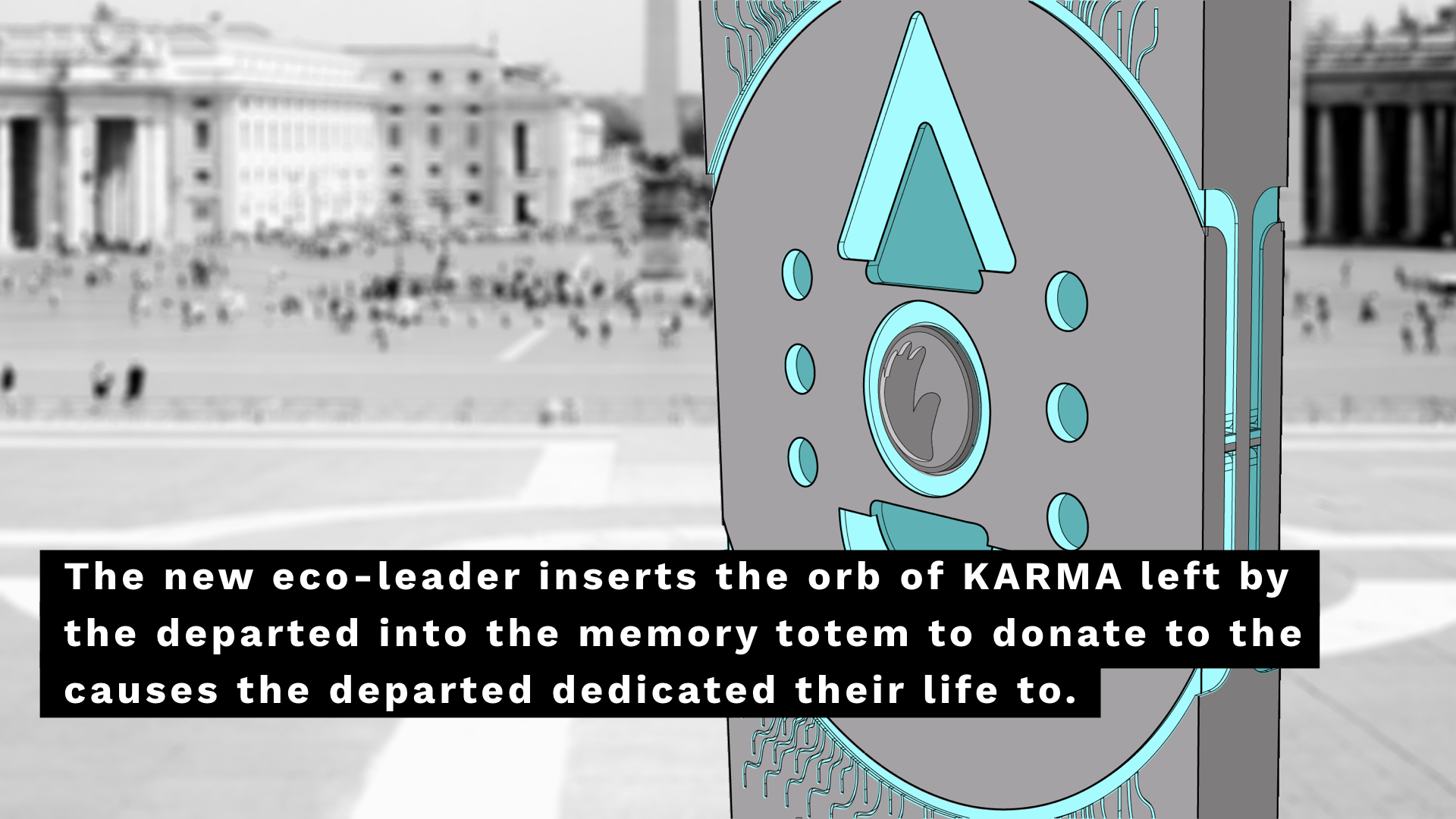
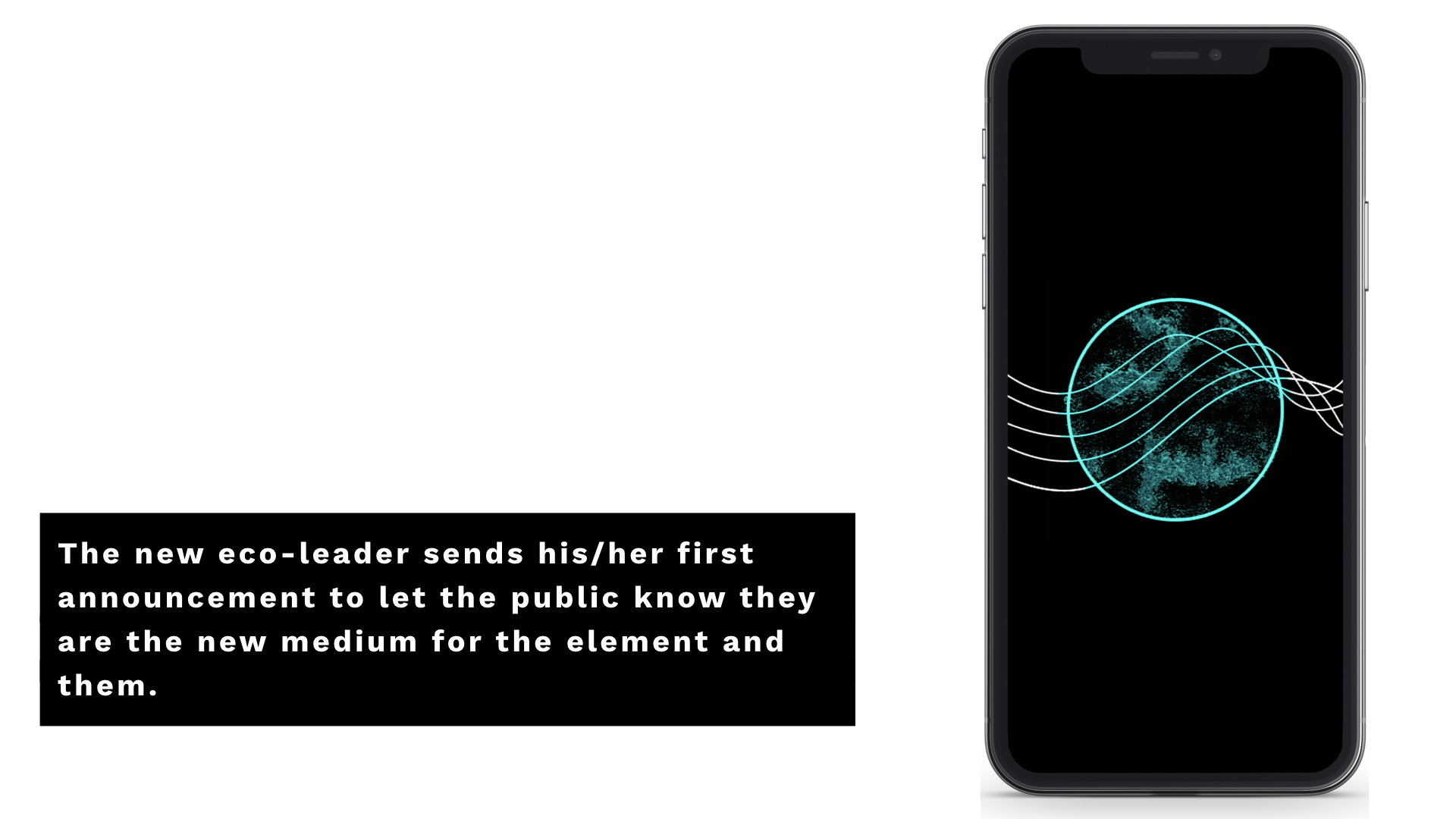
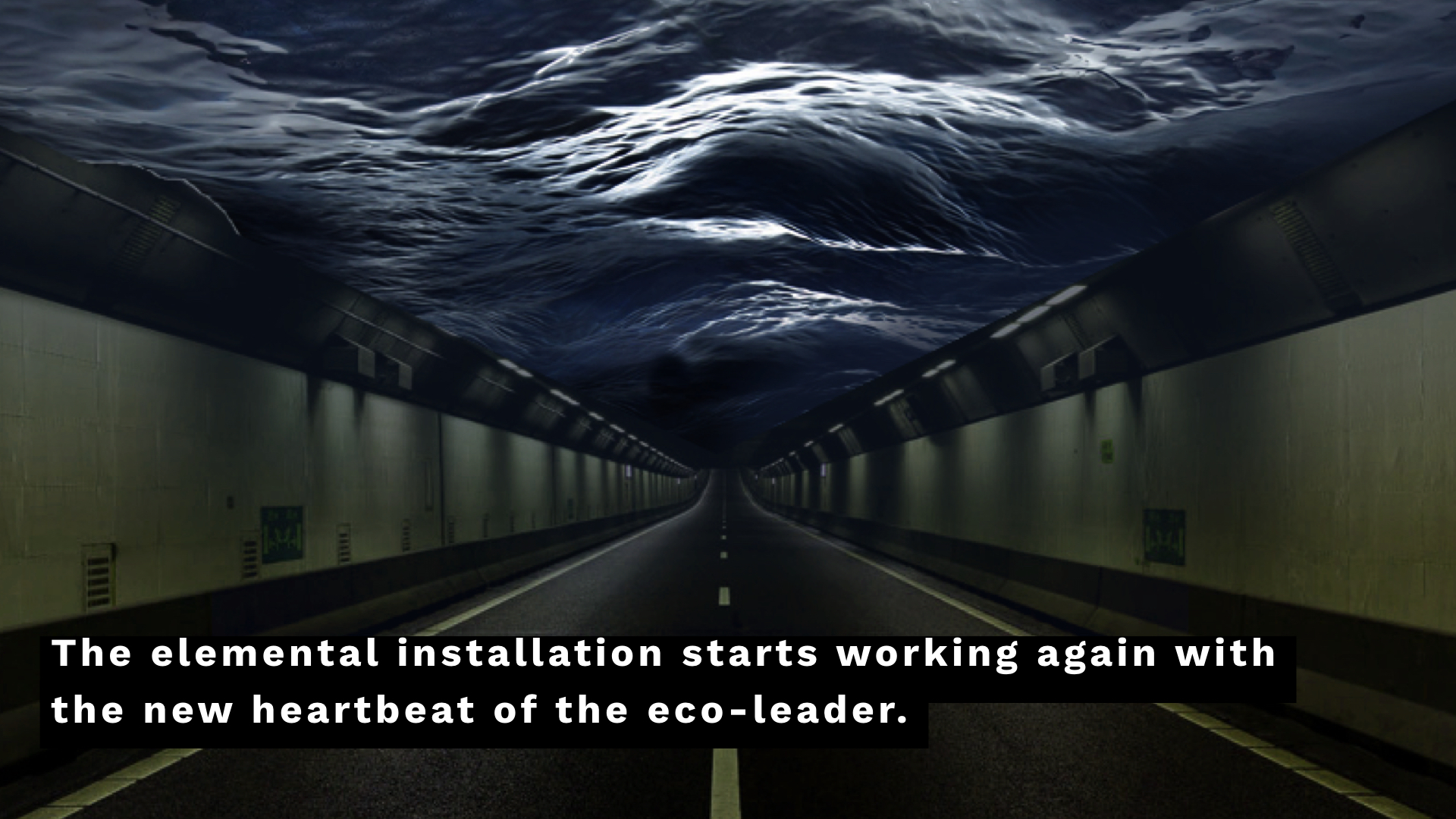
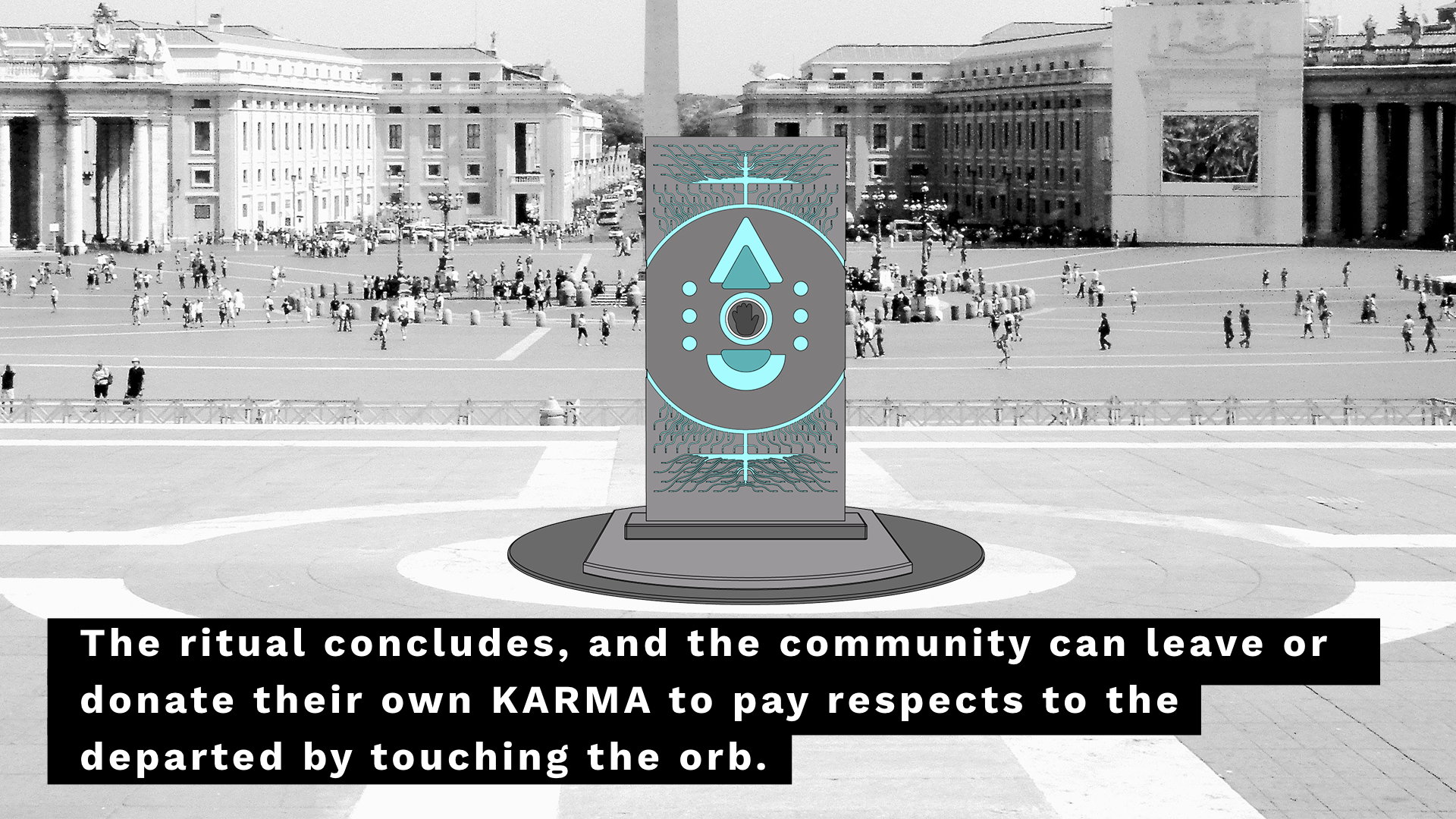
The death ritual for an eco-hero consists of four key events: the decomposition of the eco-hero's body, a live commemoration of their legacy, the eco-hero's successor taking their oath, and the donation of the eco-hero's remaining KARMA.
In our 2080 society, a funeral is no longer just for commemorating the departed's memory, but to also recognize their moderate life dedicated to sustainability.
Once an eco-hero has departed, their body is decomposed into the reusable form of their choice. For example, if they dedicated their life to cleaning polluted oceans they could decompose their body into a coral reef.
During the death ritual, close family and friends, and the community are provided with 'memory leaves' to leave their memory of the eco-hero on their 'memory totem.' At the sunset of the ritual, the eco-hero's successor takes an oath to uphold the legacy set by the previous eco-hero, and donates the remaining KARMA left by the departed. The public can then choose to pay tribute to the departed eco-hero by leaving a donation to the same causes or exit the proceeding.
In our 2080 society, a funeral is no longer just for commemorating the departed's memory, but to also recognize their moderate life dedicated to sustainability.
Once an eco-hero has departed, their body is decomposed into the reusable form of their choice. For example, if they dedicated their life to cleaning polluted oceans they could decompose their body into a coral reef.
During the death ritual, close family and friends, and the community are provided with 'memory leaves' to leave their memory of the eco-hero on their 'memory totem.' At the sunset of the ritual, the eco-hero's successor takes an oath to uphold the legacy set by the previous eco-hero, and donates the remaining KARMA left by the departed. The public can then choose to pay tribute to the departed eco-hero by leaving a donation to the same causes or exit the proceeding.

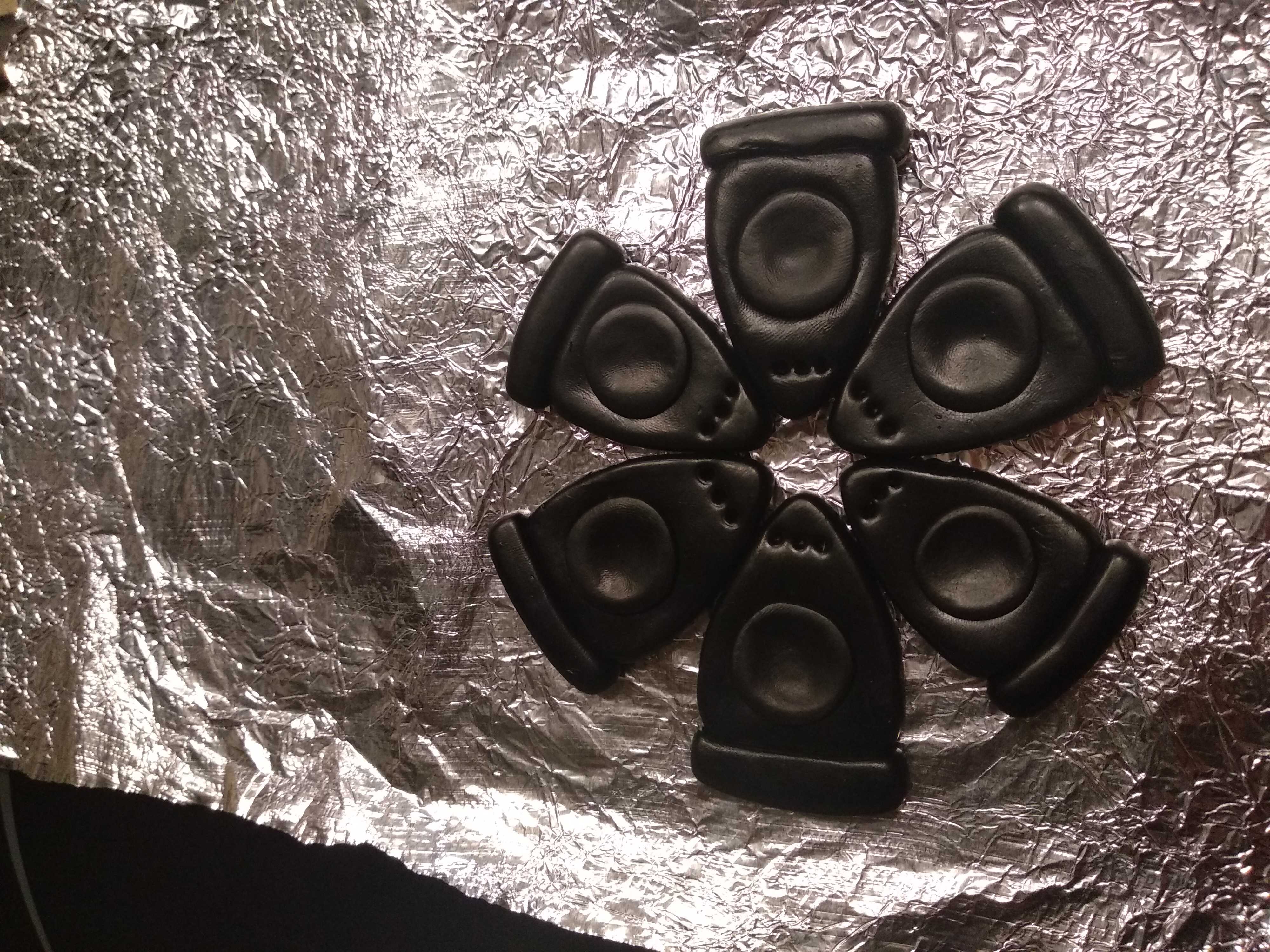
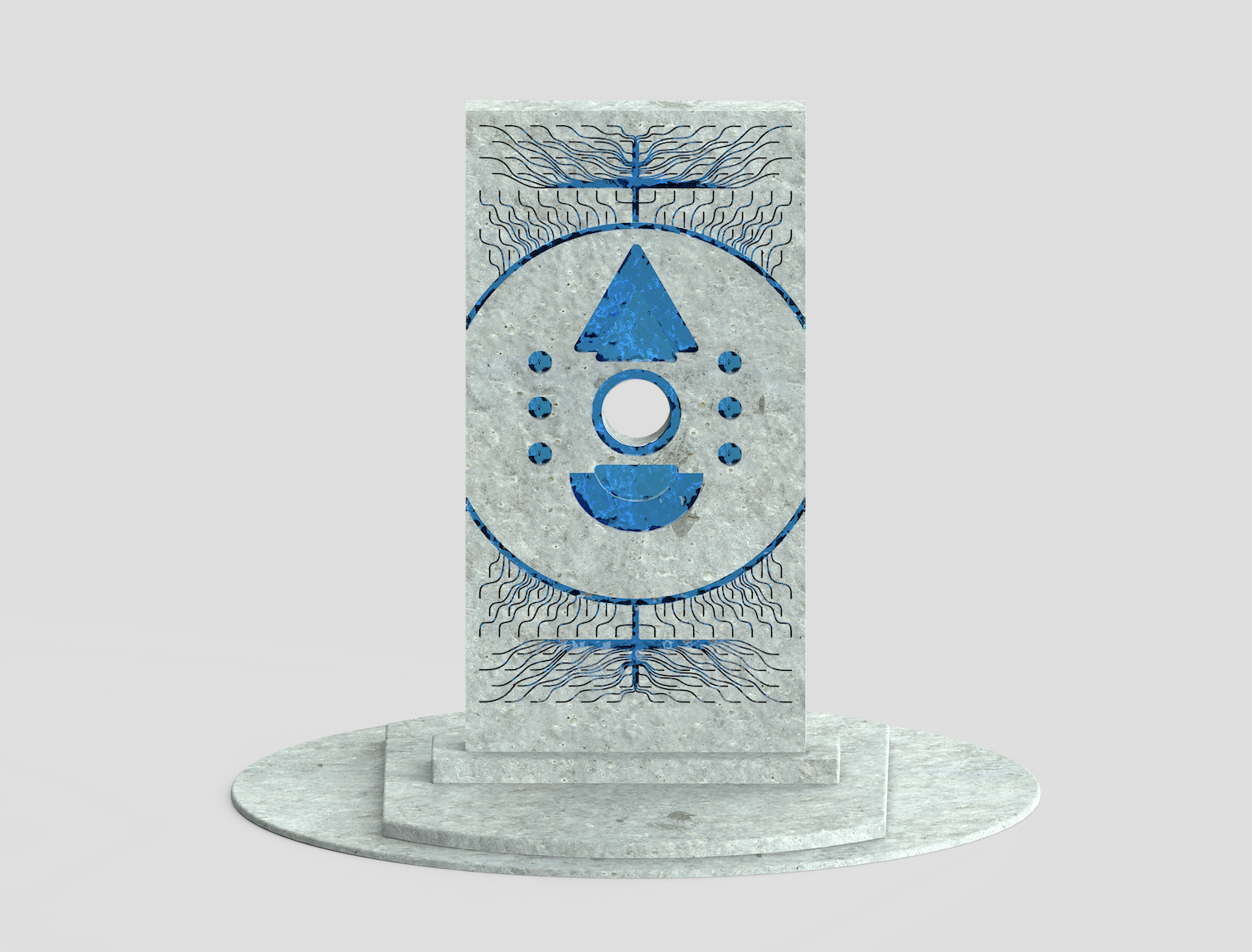
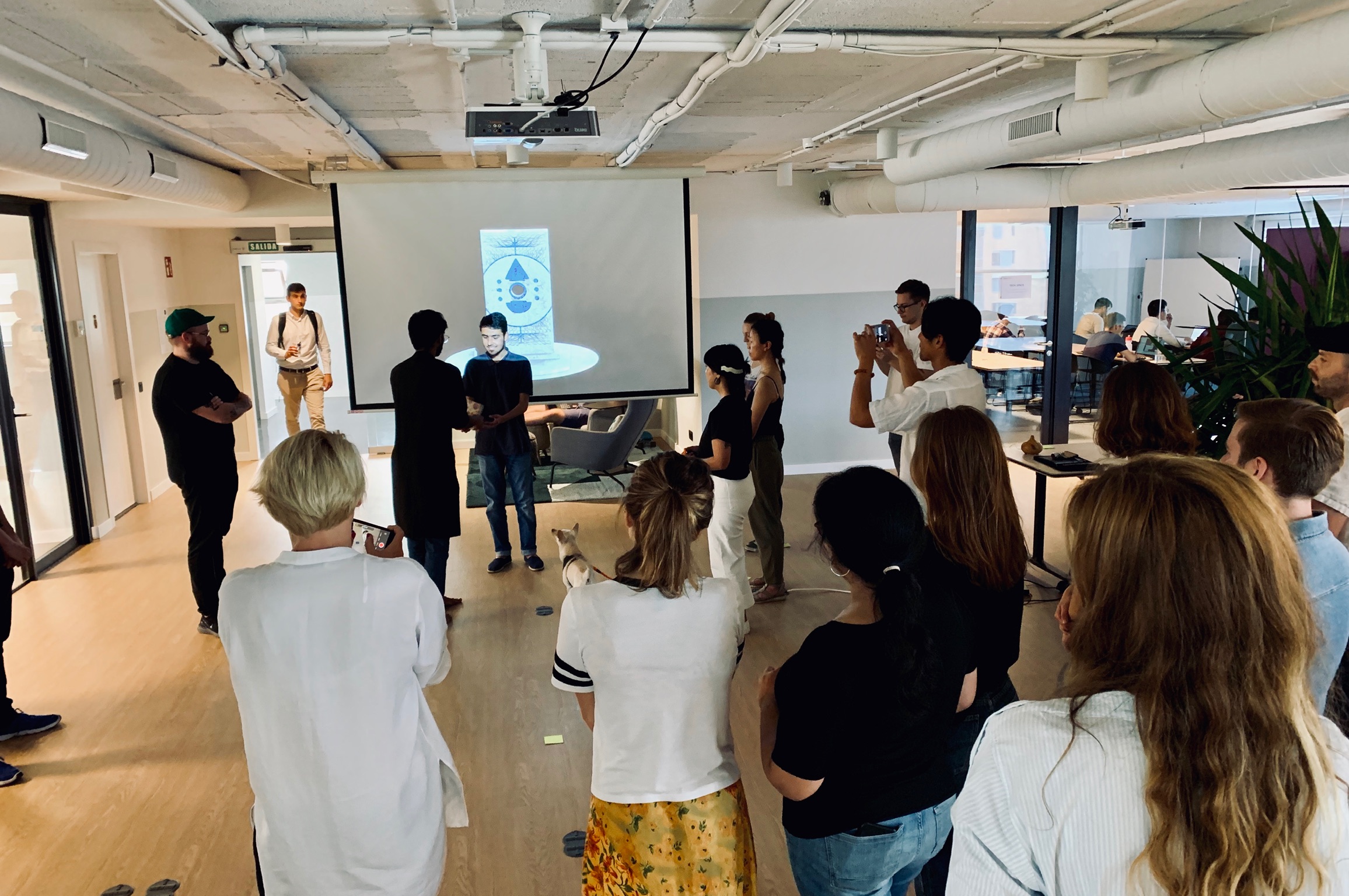

Together we can achieve a society where the planet and its inhabitants are living in harmony. Let's all do our individual part and work towards a 100% sustainable 2080 society!
